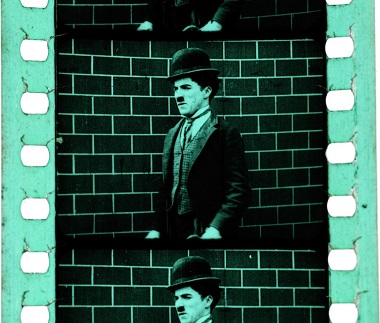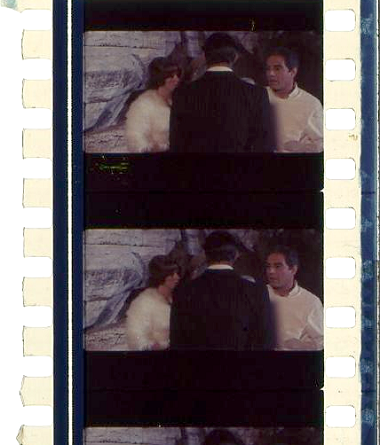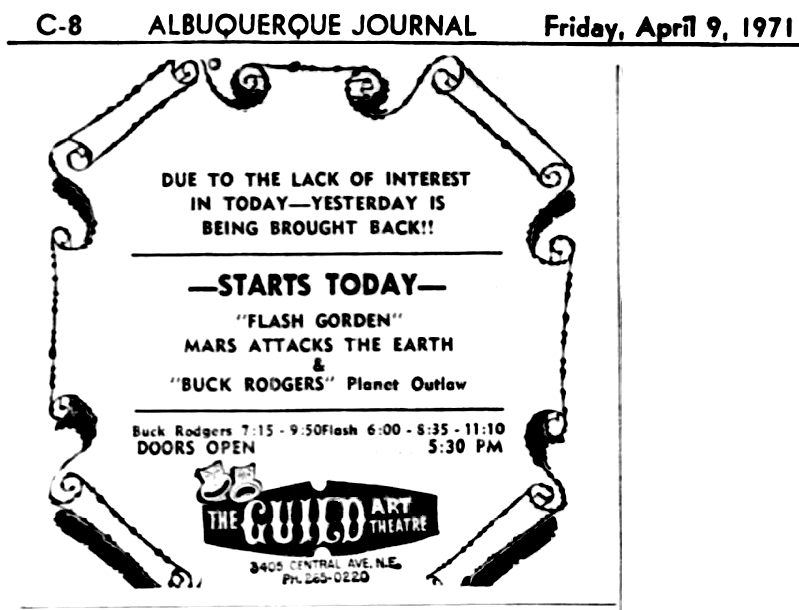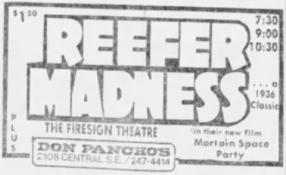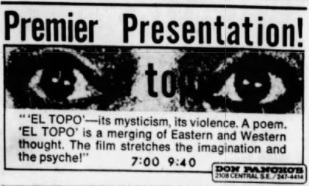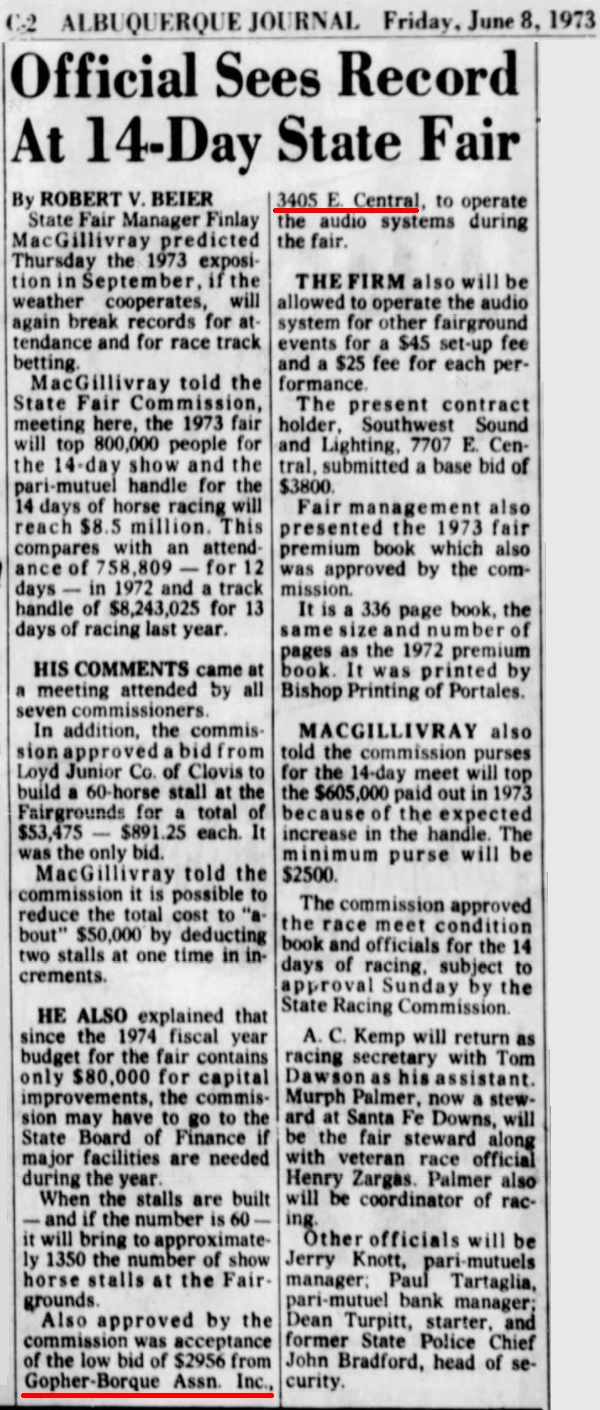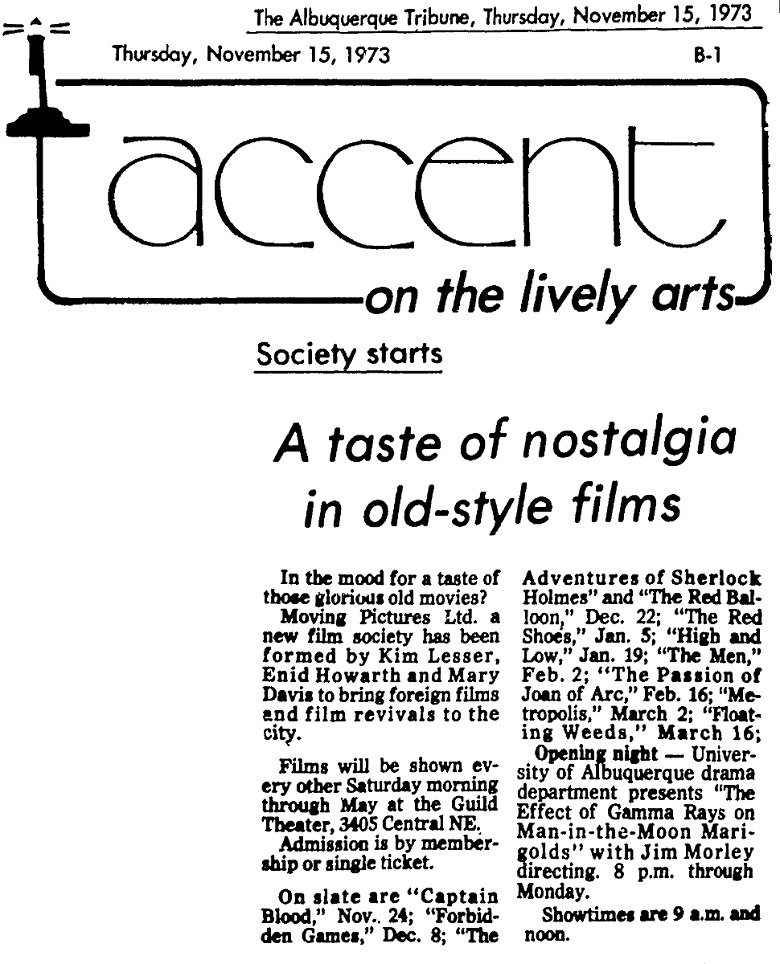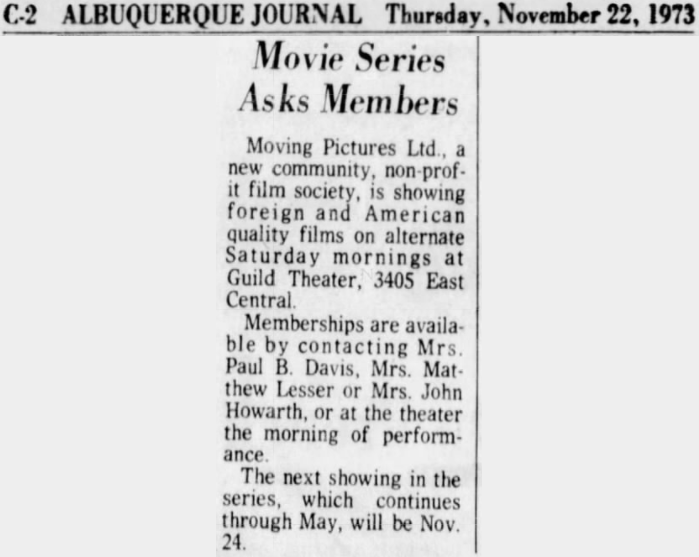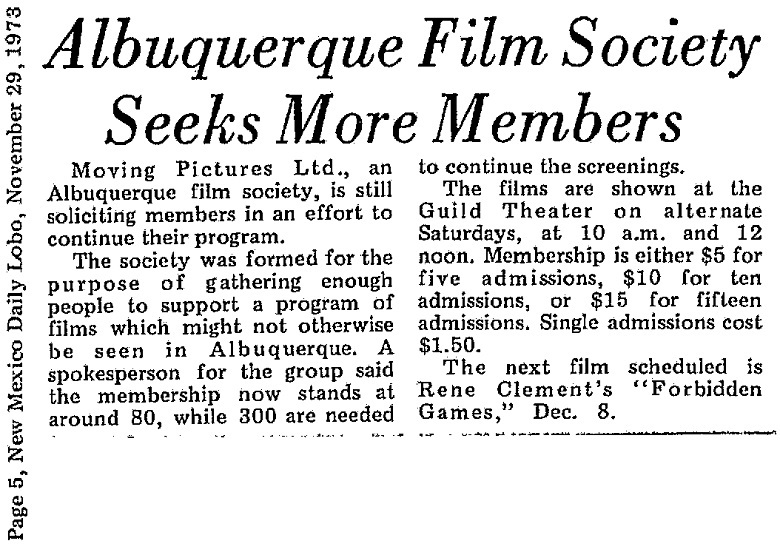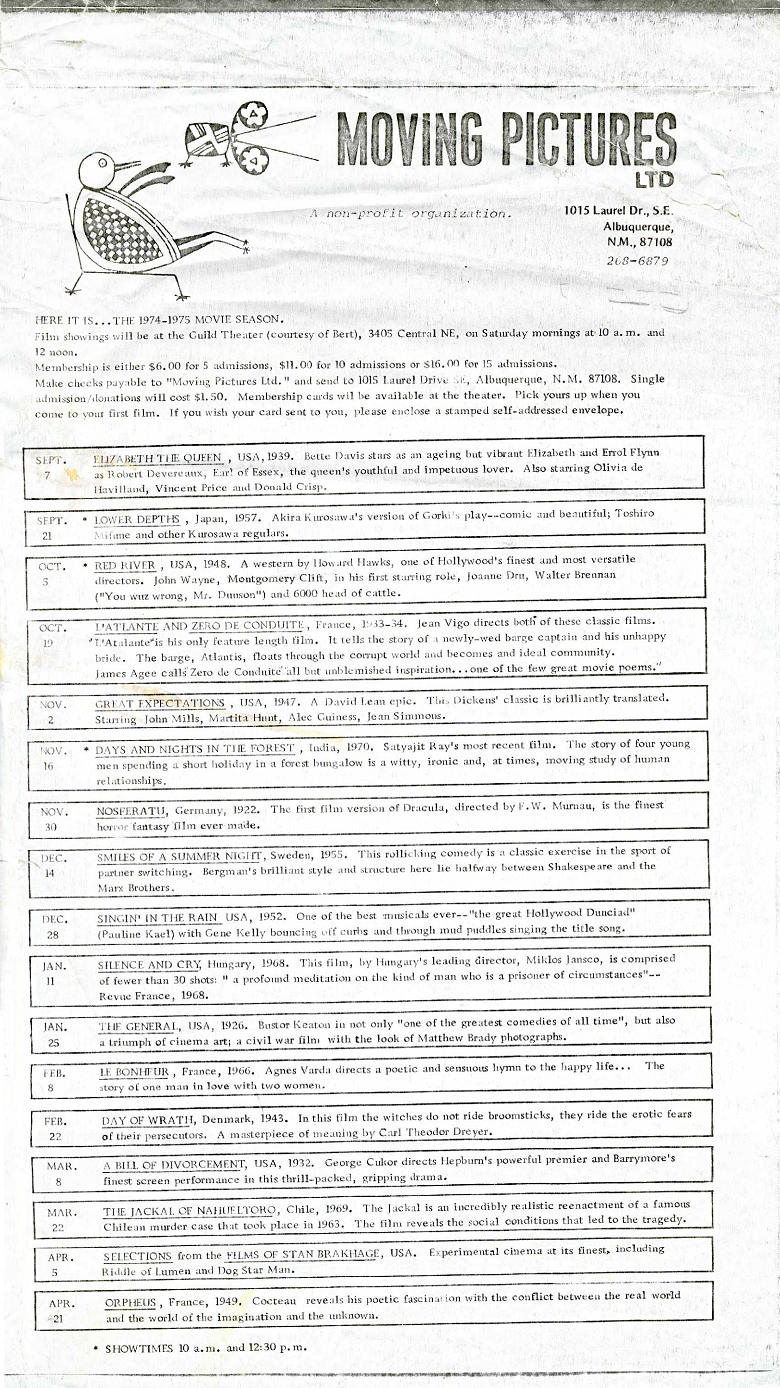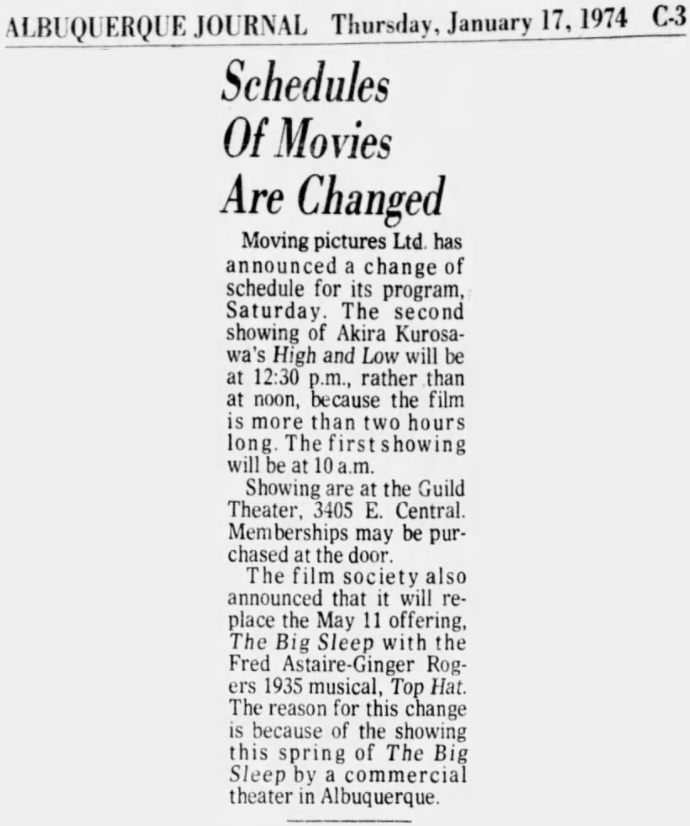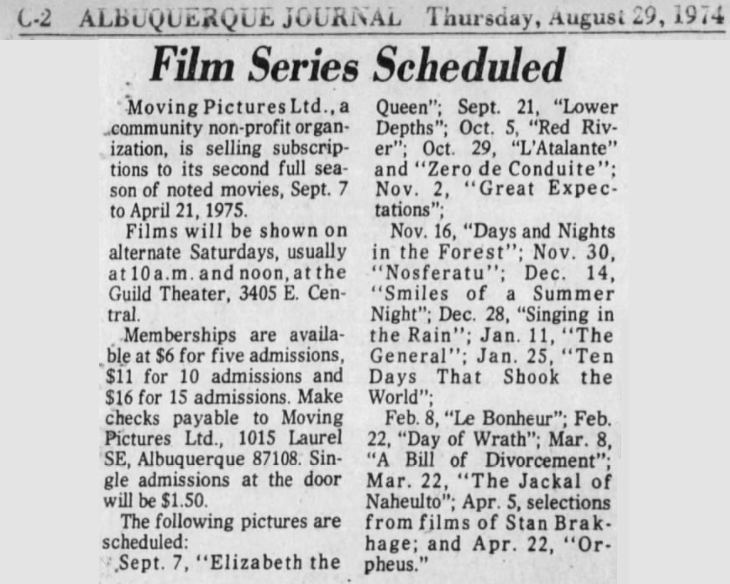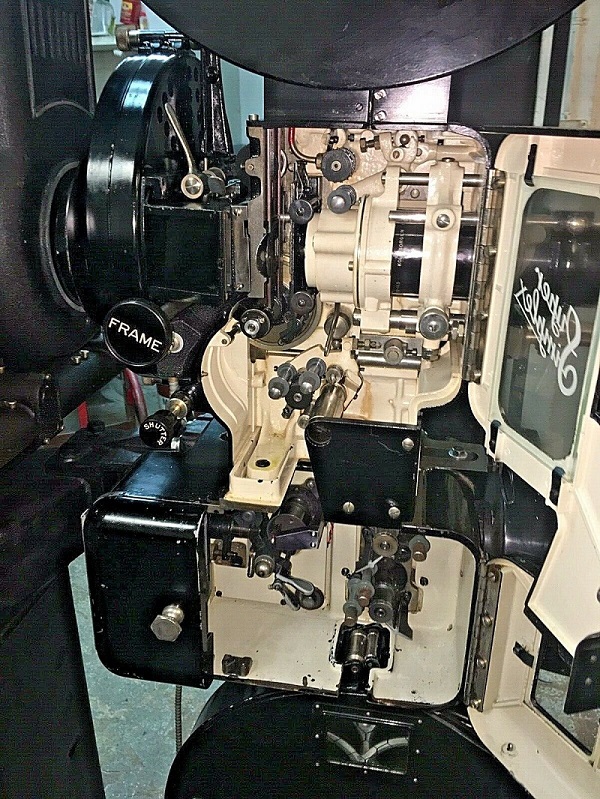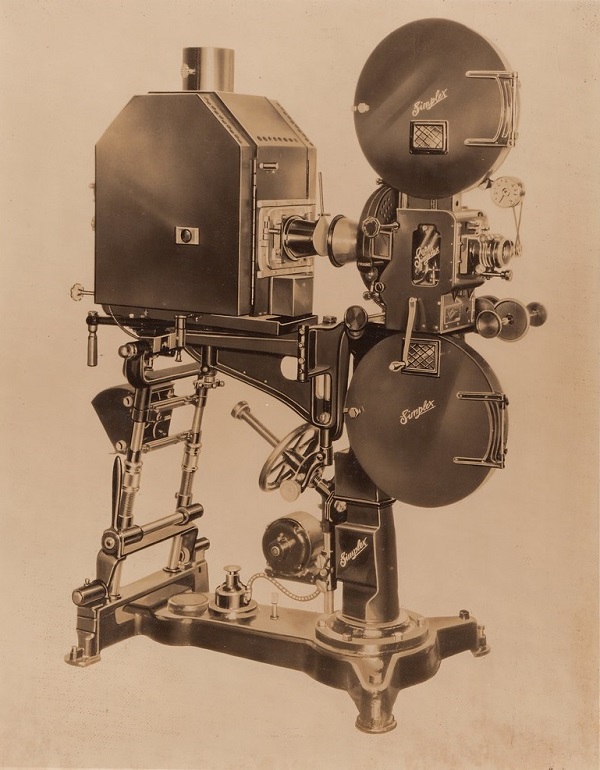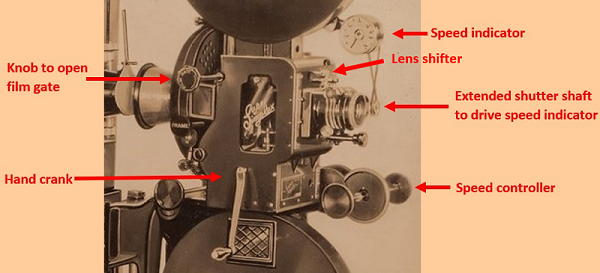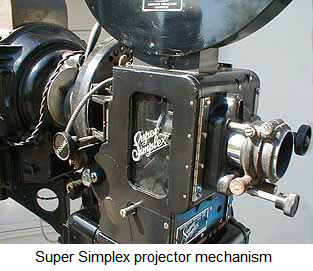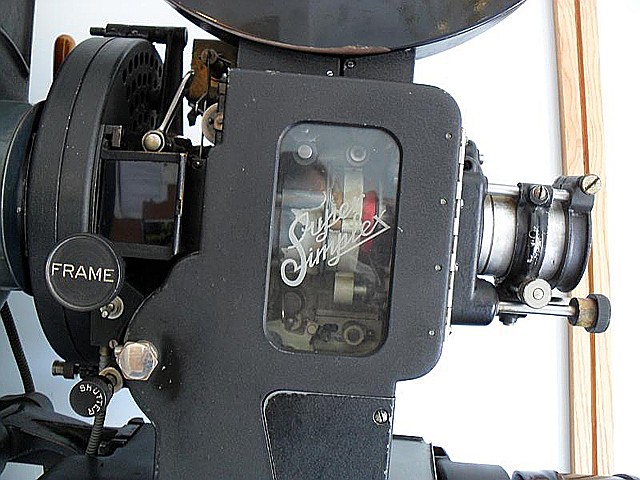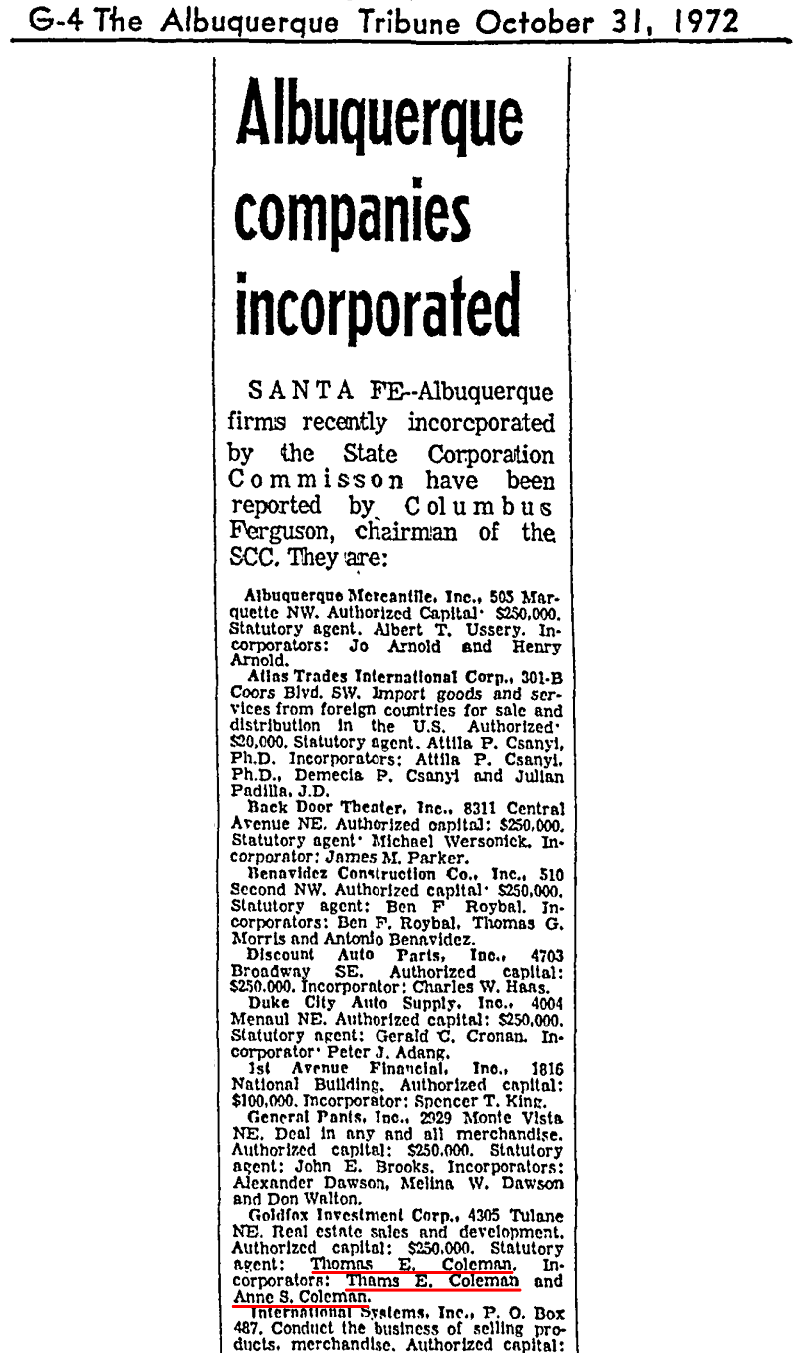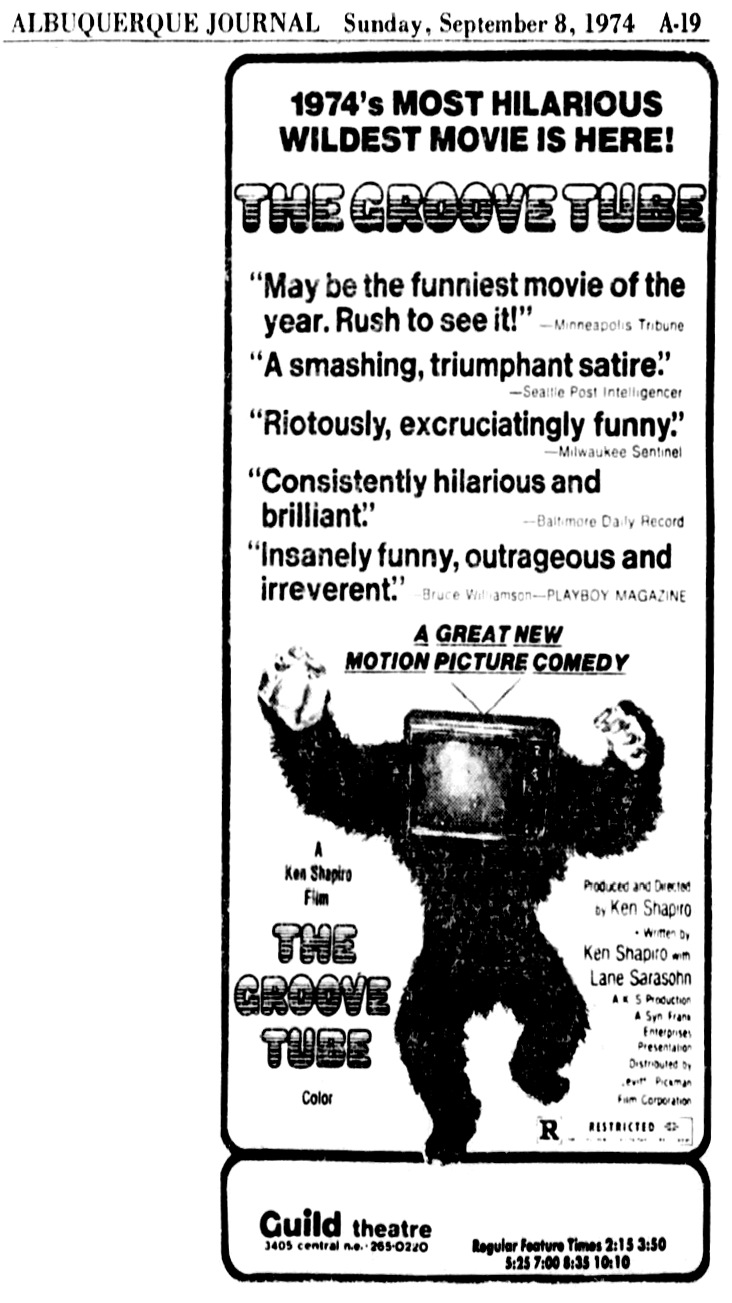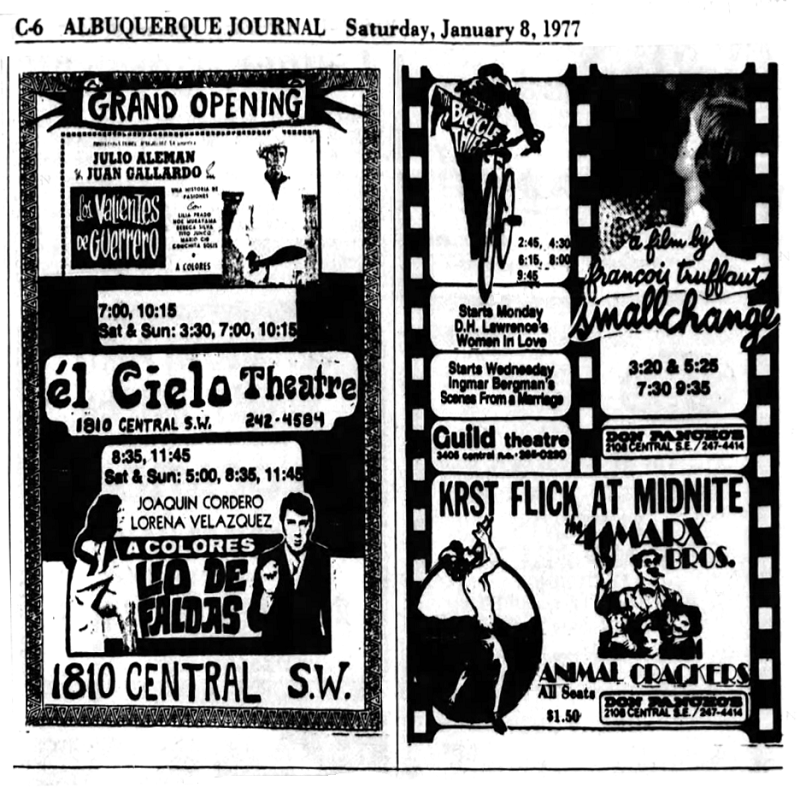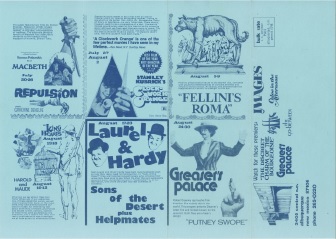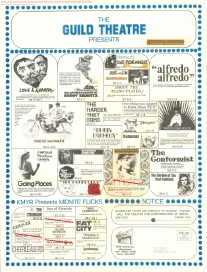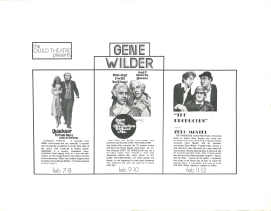|
DON PANCHO’S |
THE GUILD |
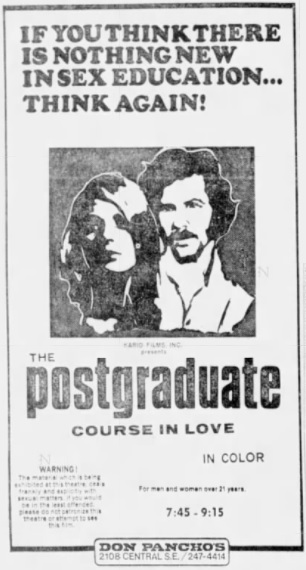 |
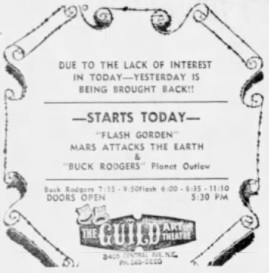 |
|
Fri 09 Apr 1971 |
The Postgraduate Course in Sexual Love (1970, hardcore) |
Fri 09 Apr 1971 |
Buck Rogers: Planet Outlaw (1939, CROPPED; premièred at the Mesa 28 Nov 1939)
Flash Gordon: Mars Attacks the Earth (1938, CROPPED; original serial premièred at the Mesa 18 Mar 1938) |
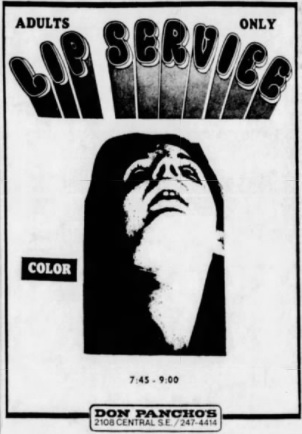 |
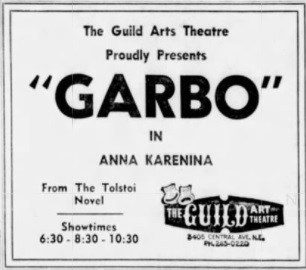 |
|
Fri 16 Apr 1971 |
Lip Service (1970, hardcore) |
Fri 16 Apr 1971 |
Anna Karenina (1935, CROPPED; premièred at the Sunshine 20 Sep 1935) |
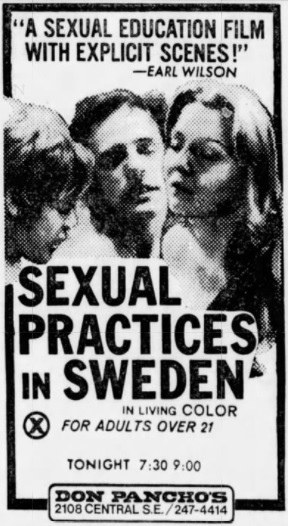 |
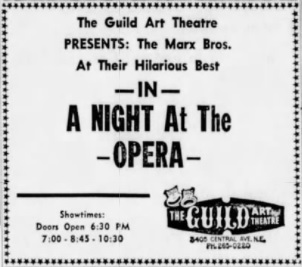 |
|
Fri 23 Apr 1971 |
Sexual Practices in Sweden (1970, hardcore) |
Fri 23 Apr 1971 |
A Night at the Opera (1935, CROPPED; premièred at the Sunshine 27 Dec 1935) |
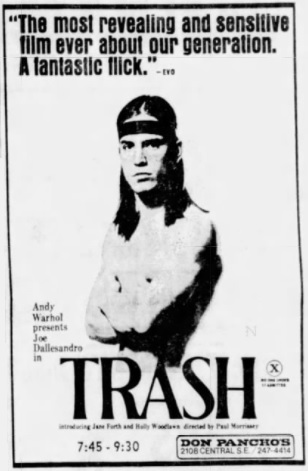 |
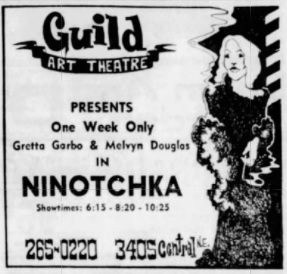 |
|
Fri 30 Apr 1971 |
Trash (1970, CROPPED; Albuquerque première) |
Fri 30 Apr 1971 |
Ninotchka (1939, CROPPED; premièred at the Sunshine 30 Dec 1939) |
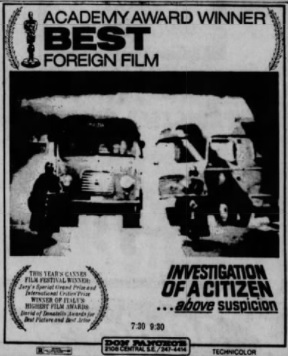 |
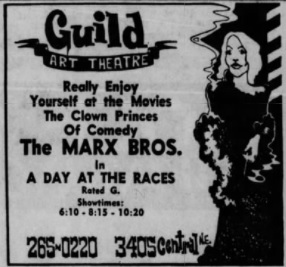 |
|
Fri 07 May 1971 |
Investigation of a Citizen above Suspicion (1970; Albuquerque première) |
Fri 07 May 1971 |
A Day at the Races (1937, CROPPED; premièred at the KiMo 12 Jun 1937) |
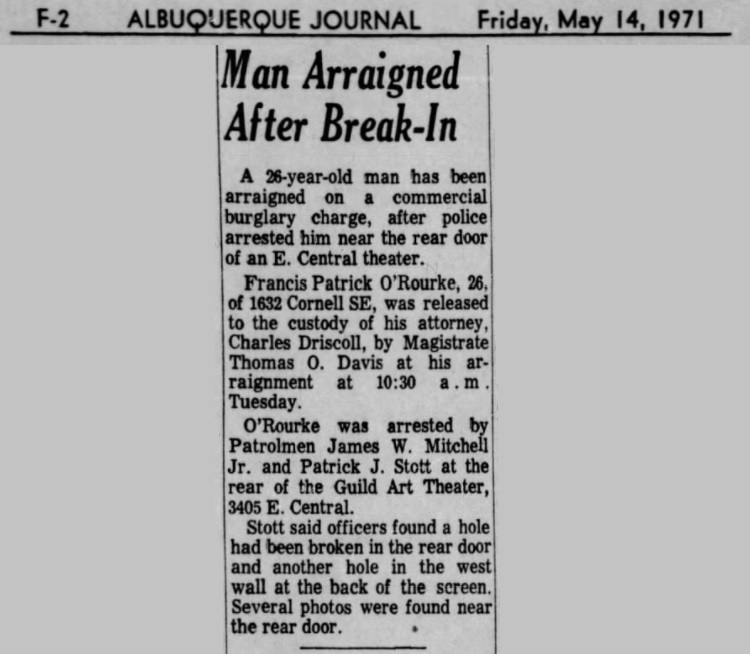 |
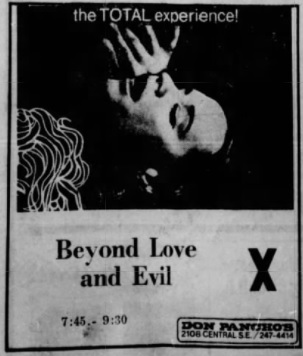 |
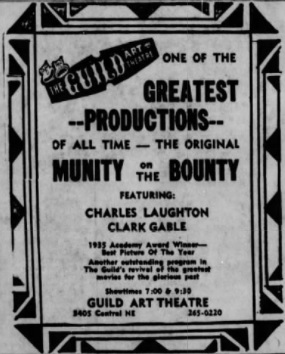 |
|
Fri 14 May 1971 |
Beyond Love and Evil (1969) |
Fri 14 May 1971 |
Mutiny on the Bounty (1935, CROPPED; premièred at the Sunshine 16 Nov 1935) |
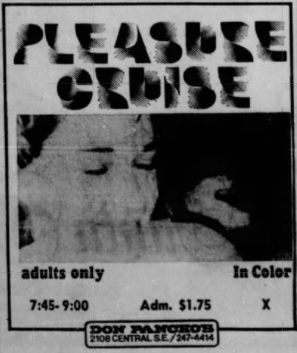 |
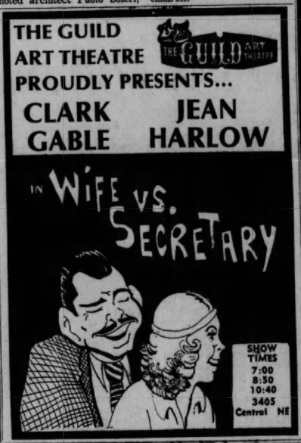 |
|
Fri 21 May 1971 |
Pleasure Cruise (1969, hardcore) |
Fri 21 May 1971 |
Wife vs. Secretary (1936, CROPPED; premièred at the Sunshine 13 Mar 1936) |
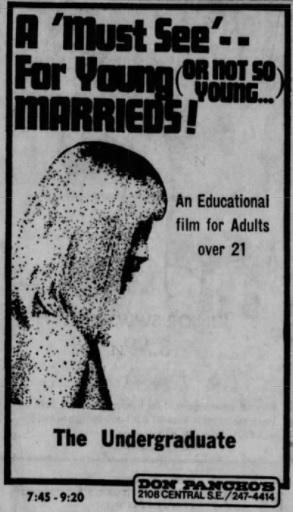 |
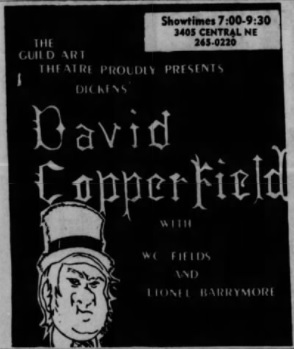 |
|
Fri 28 May 1971 |
The Undergraduate (1971, hardcore) |
Fri 28 May 1971 |
David Copperfield (1935, CROPPED; premièred at the Sunshine 29 Mar 1935) |
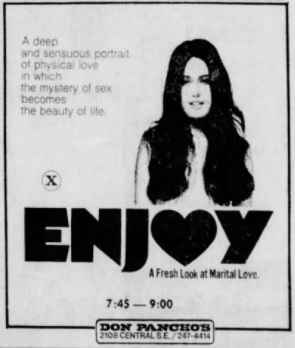 |
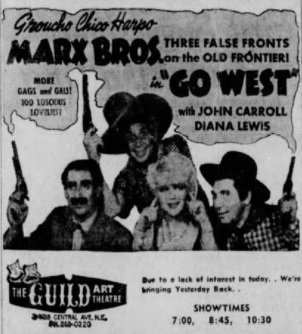 |
|
Fri 04 Jun 1971 |
Enjoy: A Fresh Look at Marital Love (1970, hardcore?) |
Fri 04 Jun 1971 |
Go West (1940, CROPPED; premièred at the Sunshine 31 Dec 1940) |
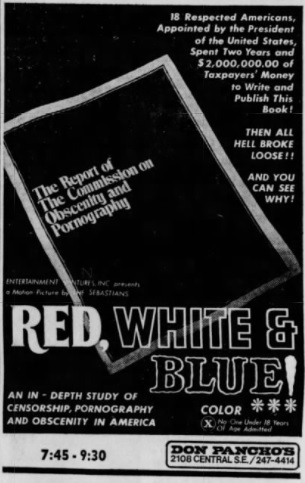 |
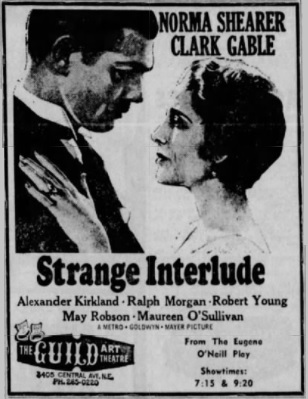 |
|
Fri 11 Jun 1971 |
Red, White & Blue (1971; Albuquerque première) |
Fri 11 Jun 1971 |
Strange Interlude (1932, CROPPED; premièred at the Sunshine 21 Jan 1933) |
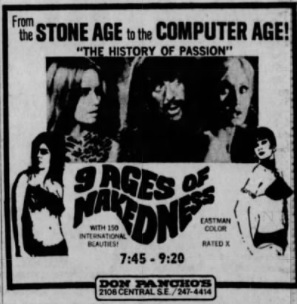 |
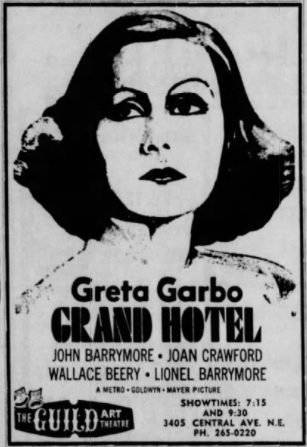 |
|
Fri 18 Jun 1971 |
The 9 Ages of Nakedness (1969) |
Fri 18 Jun 1971 |
Grand Hotel (1932, CROPPED; premièred at the Mission 10 Aug 1932) |
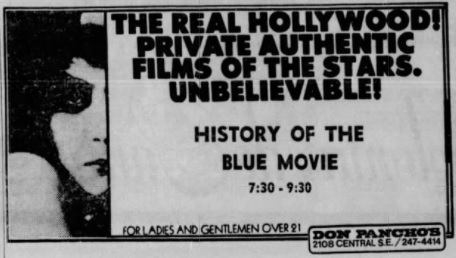 |
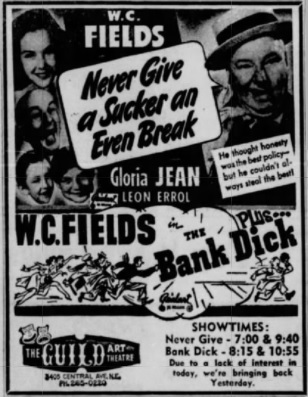 |
|
Fri 25 Jun 1971 |
History of the Blue Movie (1970, Sherpix, hardcore) |
Fri 25 Jun 1971 |
Never Give a Sucker an Even Break (1941, CROPPED; premièred at the KiMo 24 Nov 1941)
The Bank Dick (1940, CROPPED; premièred at the Rio 08 Feb 1941) |
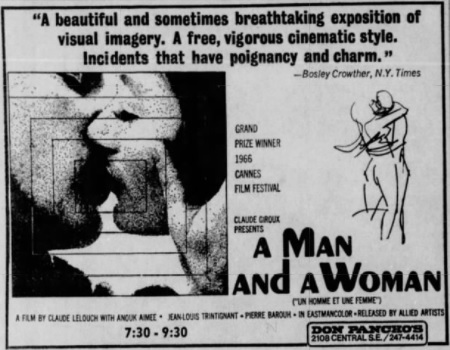 |
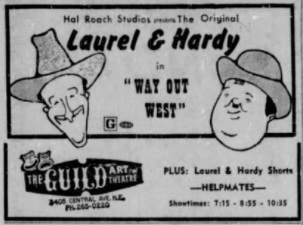 |
|
Fri 02 Jul 1971 |
A Man and a Woman (1966; premièred at Don Pancho’s 24 Feb 1967) |
Fri 02 Jul 1971 |
Way Out West (1937, CROPPED; premièred at the Mesa 22 Jul 1937)
SHORT:
Helpmates (1932, CROPPED; premièred at the Rio 14 May 1933) |
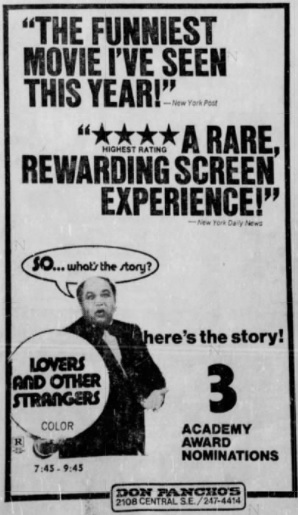 |
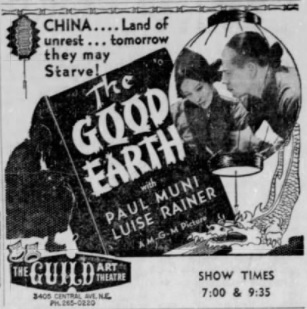 |
|
Fri 09 Jul 1971 |
Lovers and Other Strangers (1970; premièred at the Hiland 18 Nov 1970) |
Fri 09 Jul 1971 |
The Good Earth (1937, CROPPED; premièred at the Sunshine 28 Sep 1937) |
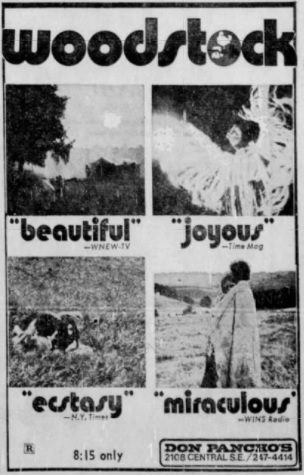 |
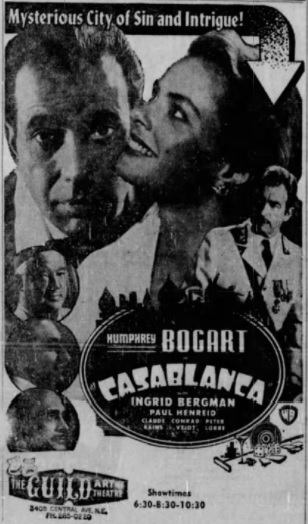 |
|
Fri 16 Jul 1971 |
Woodstock (1970; premièred at the Hiland 22 Jul 1970) |
Fri 16 Jul 1971 |
Casablanca (1942, CROPPED; premièred at the KiMo 29 Jan 1943) |
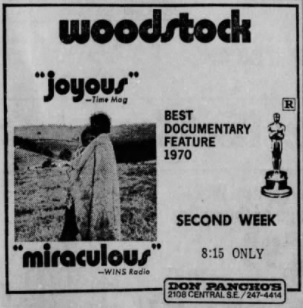 |
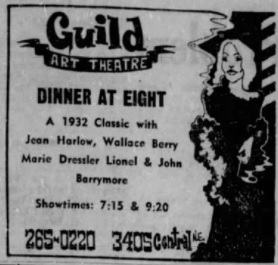 |
|
Fri 23 Jul 1971 |
Woodstock (1970; premièred at the Hiland 22 Jul 1970) |
Fri 23 Jul 1971 |
Dinner at Eight (1933, CROPPED; premièred at the Sunshine 06 Jan 1934) |
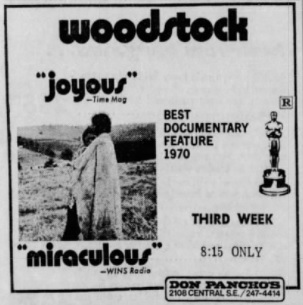 |
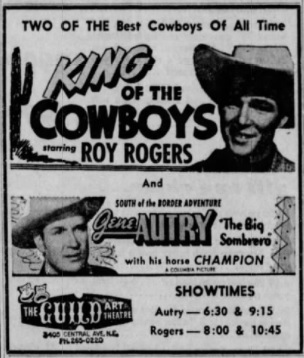 |
|
Fri 30 Jul 1971 |
Woodstock (1970; premièred at the Hiland 22 Jul 1970) |
Fri 30 Jul 1971 |
King of the Cowboys (1943, CROPPED; premièred at the Rio 06 Jun 1943)
The Big Sombrero (1949, CROPPED; premièred at El Rey 22 Jun 1949) |
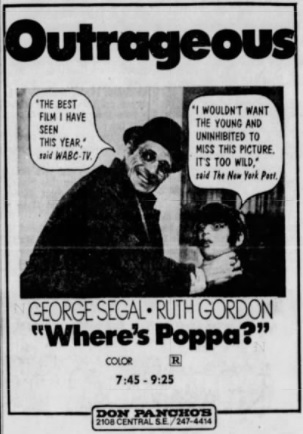 |
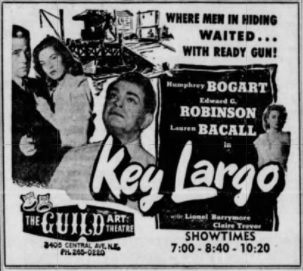 |
|
Fri 06 Aug 1971 |
Where’s Poppa? (premièred at the Lobo 30 Dec 1970) |
Fri 06 Aug 1971 |
Key Largo (1948, CROPPED; premièred at the KiMo 12 Aug 1948) |
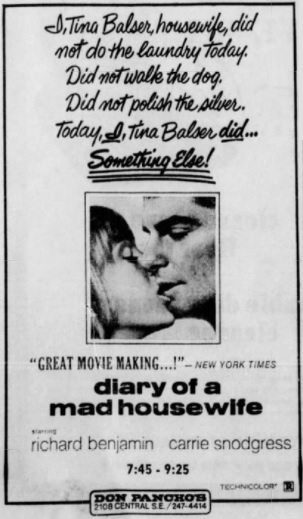 |
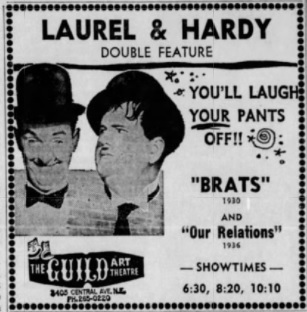 |
|
Fri 13 Aug 1971 |
Diary of a Mad Housewife (1970; premièred at the Cinema East 25 Dec 1970) |
Fri 13 Aug 1971 |
Our Relations (1936, CROPPED; premièred at the KiMo 09 Dec 1936)
SHORT:
Brats (1930, CROPPED; premièred at the Pastime 08 Feb 1931) |
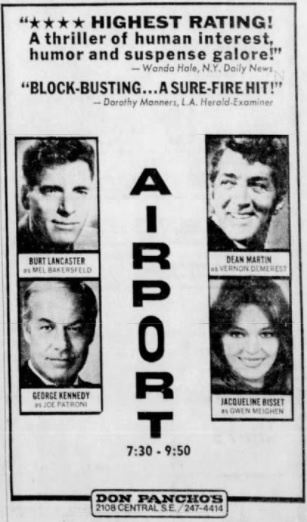 |
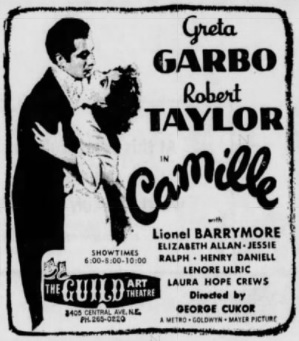 |
|
Fri 20 Aug 1971 |
Airport (1970; premièred at the Sunshine 27 May 1970) |
Fri 20 Aug 1971 |
Camille (1936, CROPPED; premièred at the Sunshine 23 Jan 1937) |
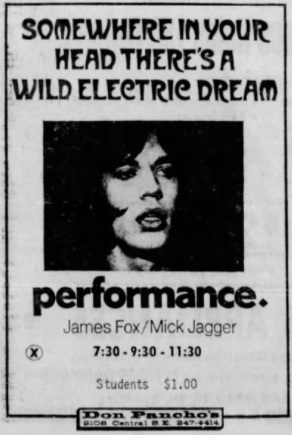 |
 |
|
Fri 27 Aug 1971 |
Performance (1970; premièred at the Lobo 04 Nov 1970) |
Fri 27 Aug 1971 |
The Big Store (1941, CROPPED; premièred at the KiMo 21 Jun 1941) |
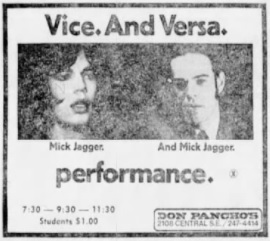 |
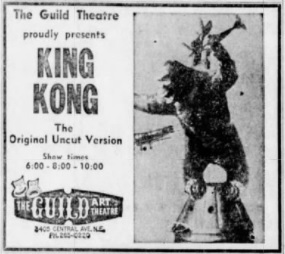 |
|
Fri 03 Sep 1971 |
Performance (1970; premièred at the Lobo 04 Nov 1970) |
Fri 03 Sep 1971 |
King Kong (1933, CROPPED; premièred at the KiMo 23 Apr 1933) |
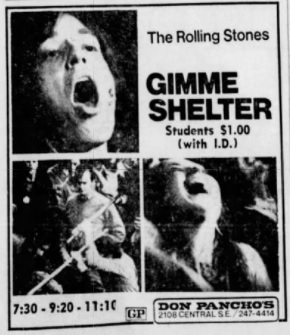 |
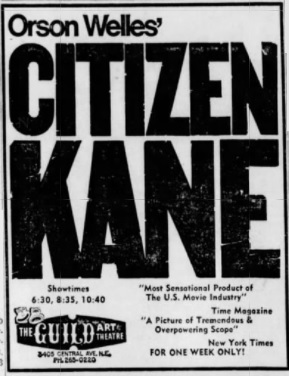 |
|
Fri 10 Sep 1971 |
Gimme Shelter (1970; Albuquerque première) |
Fri 10 Sep 1971 |
Citizen Kane (1941, CROPPED; premièred at the KiMo 16 Nov 1941) |
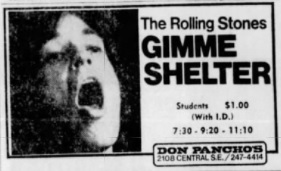 |
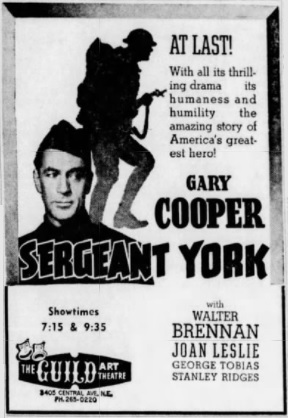 |
|
Fri 17 Sep 1971 |
Gimme Shelter (1970) |
Fri 17 Sep 1971 |
Sergeant York (1941, CROPPED; premièred at the KiMo 07 Dec 1941) |
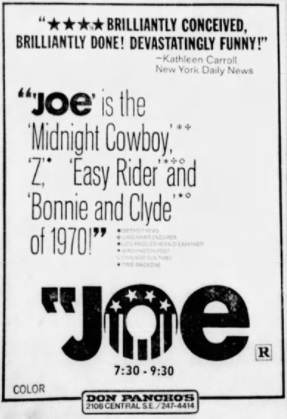 |
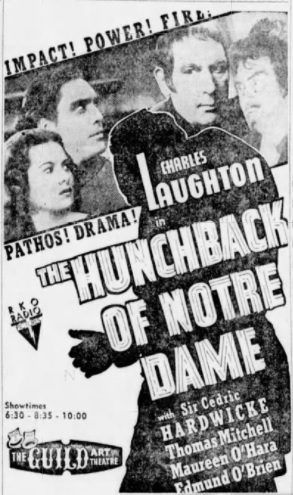 |
|
Fri 24 Sep 1971 |
Joe (1970; premièred at the Sunshine 30 Sep 1970) |
Fri 24 Sep 1971 |
The Hunchback of Notre Dame (1939, CROPPED; premièred at the KiMo 20 Jan 1940) |
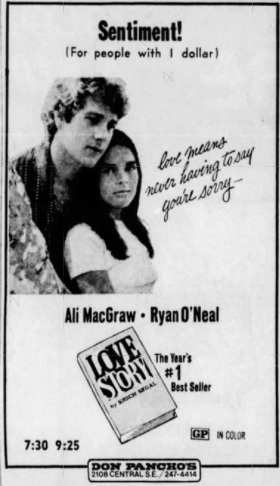 |
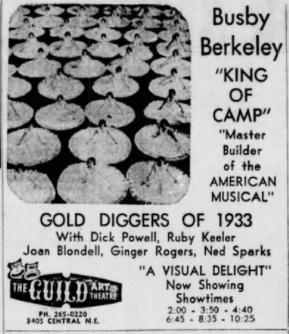 |
|
Fri 01 Oct 1971 |
Love Story (1970; premièred at the Hiland 10 Mar 1971) |
Fri 01 Oct 1971 |
Gold Diggers of 1933 (1933, CROPPED; premièred at the Sunshine 10 Nov 1933) |
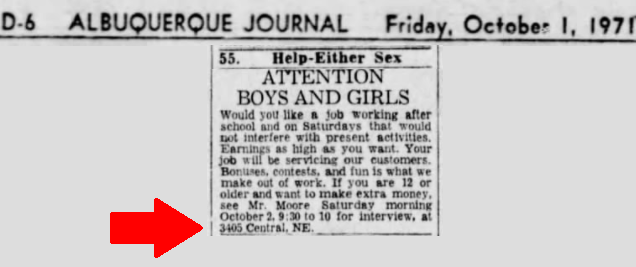 |
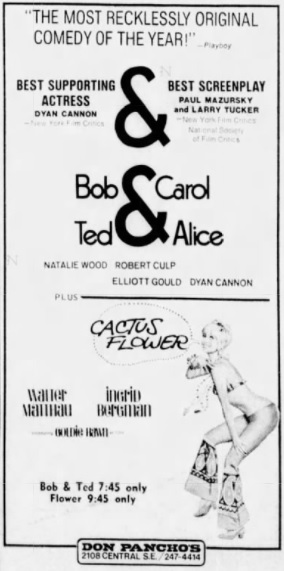 |
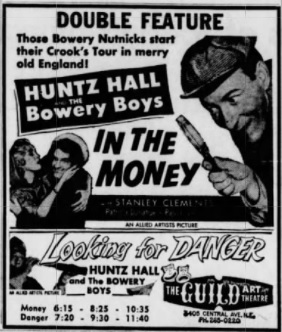 |
|
Fri 08 Oct 1971 |
Bob & Carol & Ted & Alice (1969; premièred at the Fox 25 Dec 1969)
Cactus Flower (1969; premièred at Loew’s 21 Dec 1969) |
Fri 08 Oct 1971 |
In the Money (1958; premièred at the Tri-C 04 Feb 1959)
Looking for Danger (1957; premièred at the Sunset 05 Aug 1960) |
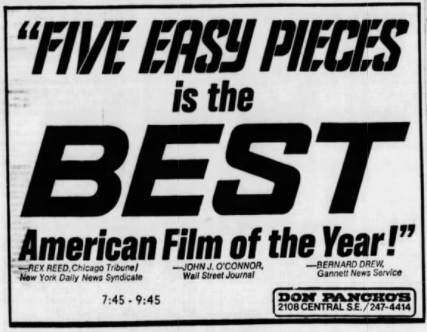 |
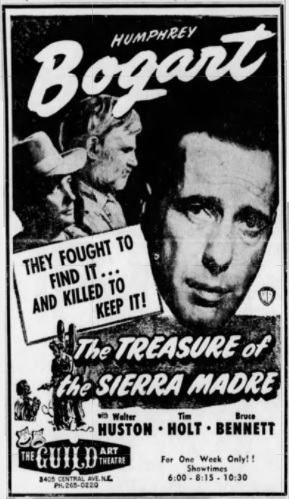 |
|
Fri 15 Oct 1971 |
Five Easy Pieces (1970; premièred at the Lobo 24 Feb 1971) |
Fri 15 Oct 1971 |
The Treasure of the Sierra Madre (1948, CROPPED; premièred at the Chief 16 Apr 1948) |
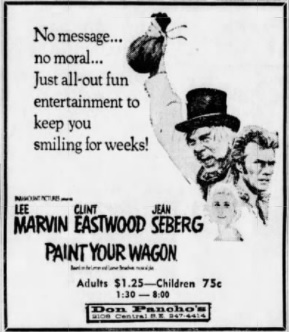 |
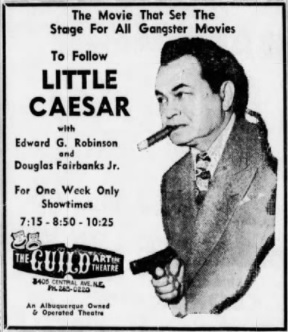 |
|
Thu 21 Oct 1971 |
Paint Your Wagon (1969; premièred at the Sunshine 25 Dec 1969) |
Fri 22 Oct 1971 |
Little Caesar (1931, CROPPED; premièred at the KiMo 26 Feb 1931) |
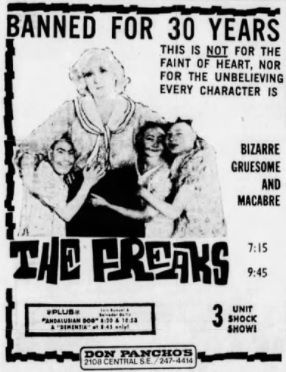 |
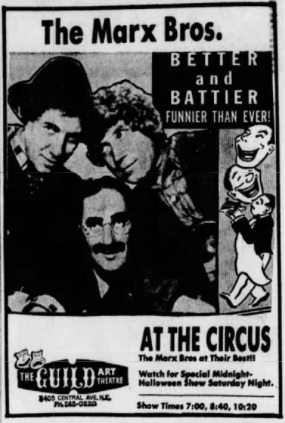 |
|
Fri 29 Oct 1971 |
Freaks (CROPPED, premièred at the Mission 27 Feb 1932)
An Andalusian Dog (1929, CROPPED; premièred at UNM 19 Jul 1952)
Dementia (1955, CROPPED; Albuquerque première) |
Fri 29 Oct 1971 |
At the Circus (1939, CROPPED; premièred at the KiMo 28 Oct 1939) |
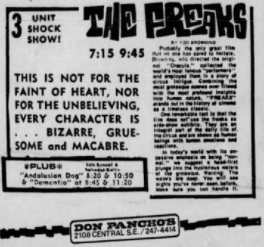 |
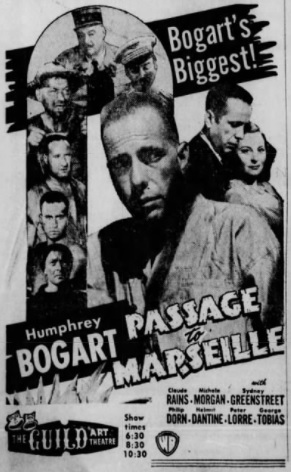 |
|
Fri 05 Nov 1971 |
Freaks (CROPPED, premièred at the Mission 27 Feb 1932)
An Andalusian Dog (1929, CROPPED; premièred at UNM 19 Jul 1952)
Dementia (1955, CROPPED) |
Fri 05 Nov 1971 |
Passage to Marseille (1944, CROPPED; premièred at the Lobo 13 Aug 1944) |
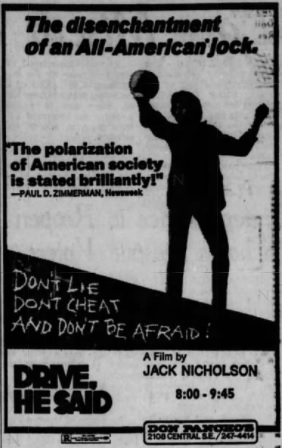 |
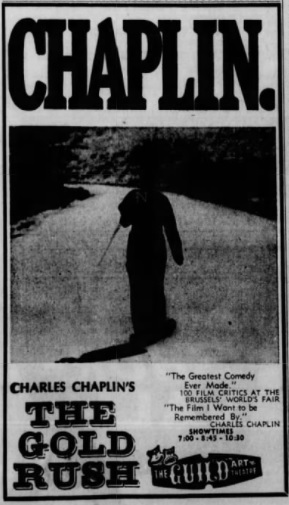
This print of The Gold Rush seems not to have been from Chaplin or his distributors.
It was Paul Killiam’s
badly re-edited edition with Bill Perry’s beautiful piano score,
now distributed by Janus.
What is the give-away? The typefont!.
|
|
Fri 12 Nov 1971 |
Drive, He Said (1971; Albuquerque première) |
Fri 12 Nov 1971 |
The Gold Rush (1925, CROPPED; premièred at the Sunshine 25 Oct 1925, 26 Jun 1942;
this was the Albuquerque cinema première of the 1970 Killiam edition) |
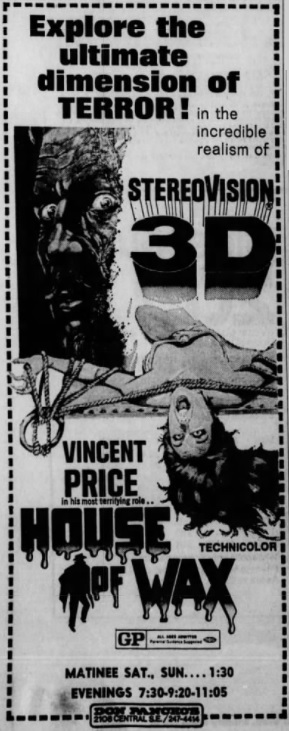 |
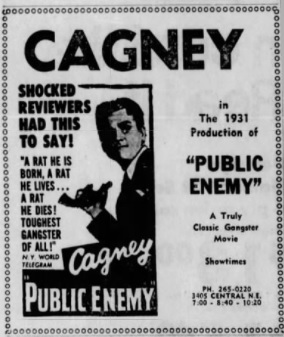 |
|
Fri 19 Nov 1971 |
House of Wax (3D, 1953; premièred at the State 28 May 1953) |
Fri 19 Nov 1971 |
The Public Enemy (1931, CROPPED; premièred at the Sunshine 05 Aug 1931) |
 |
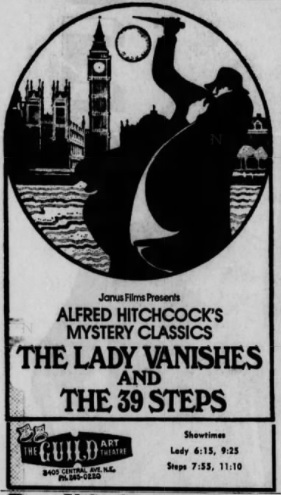 |
|
Fri 19 Nov 1971 |
House of Wax (3D, 1953; premièred at the State 28 May 1953) |
`
Fri 26 Nov 1971 |
The Lady Vanishes (1938, CROPPED; premièred at the Coronado 08 May 1940)
The 39 Steps (1935, CROPPED; premièred at the KiMo 23 Dec 1935) |

I am quite convinced that this was booked only to test Don Pancho’s setup
for Chris Condon’s 3D anamorphic side-by-side format. |
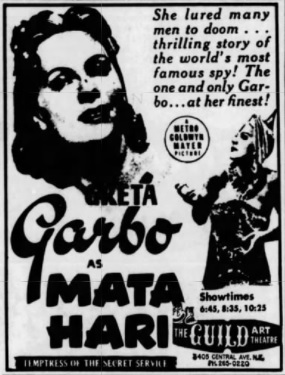 |
|
Fri 03 Dec 1971 |
House of Wax (3D, 1953; premièred at the State 28 May 1953) |
Fri 03 Dec 1971 |
Mata Hari (1931, CROPPED; premièred at the Mission 03 Jan 1932) |
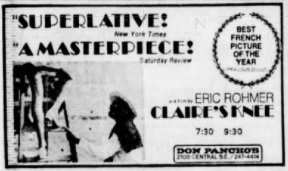 |
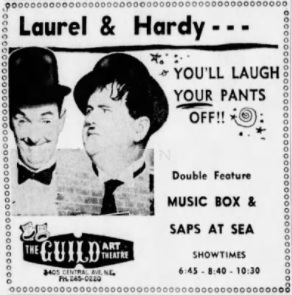 |
|
Fri 10 Dec 1971 |
Claire’s Knee (1970; Albuquerque première) |
Fri 10 Dec 1971 |
Saps at Sea (1940, CROPPED; premièred at the Mesa 22 Oct 1940)
SHORT:
The Music Box (1932, CROPPED; premièred at the Pastime 11 Nov 1932) |
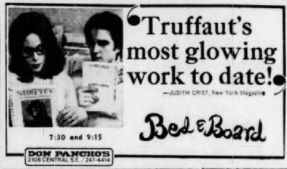 |
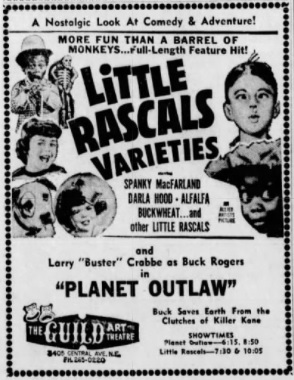 |
|
Fri 17 Dec 1971 |
Bed & Board (1970; Albuquerque première) |
Fri 17 Dec 1971 |
Little Rascals Varieties (1959, CROPPED; premièred at the State 22 Jul 1959)
Buck Rogers: Planet Outlaw (1939, CROPPED; premièred at the Mesa 28 Nov 1939) |
Business at The Guild had been disappointing.
It was time to experiment, and so, beginning on Christmas Day 1971, there was a switch from nostalgia to cult.
The usual terms were the same, I think:
$150 guarantee for each booking, plus 60% of any net above that.
Mean average ticket sales per movie: $400.
That’s $250 above the guarantee, minus operating expenses (utilities, payroll, maintenance, supplies).
I assume that operating expenses were about $250, maybe more.
Percentage owed to the distributor: 60% of zero.
The deficit could be made up from the concessions counter.
It was a bare-bones business.
From outward appearances, business picked up significantly when 1960’s/1970’s repertory replaced
1920’s/1930’s/1940’s repertory.
|
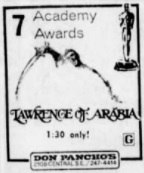 |
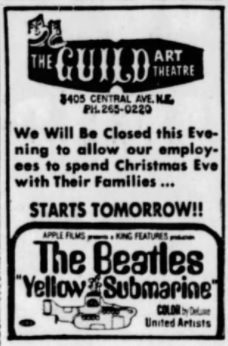 |
|
Fri 24 Dec 1971 |
Lawrence of Arabia (1962; premièred at the Fox 28 May 1963) |
Sat 25 Dec 1971 |
Yellow Submarine (1968; premièred at the Cinema East 28 Jan 1969) |
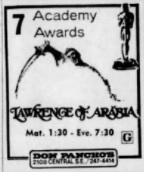 |
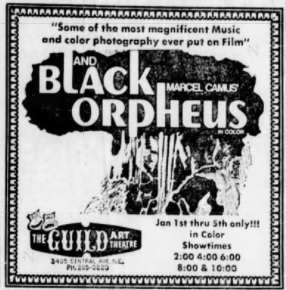 |
|
Fri 31 Dec 1971 |
Lawrence of Arabia (1962; premièred at the Fox 28 May 1963) |
Sat 01 Jan 1972 |
Black Orpheus (1959; premièred at the Lobo 12 May 1960) |
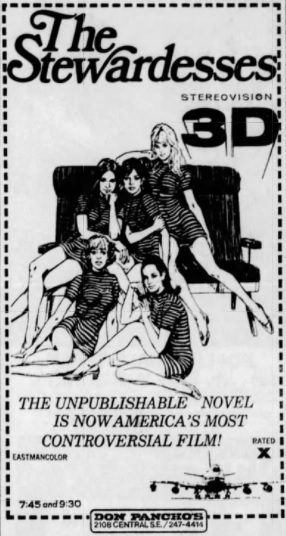 |
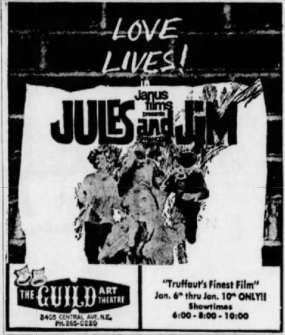 |
|
Fri 07 Jan 1972 |
The Stewardesses (3D, 1969,
Blu-ray) |
Thu 06 Jan 1972 |
Jules and Jim (1962; premièred at Don Pancho’s 30 Aug 1962) |
Oh how little I knew! Do you know why Don Pancho’s ran The Stewardesses?
Because Don Pancho’s owner, Louis K. Sher, produced it!
He had established a new company called Sherpix and pooled some money with some other producers
to come up with this prank that turned into a megahit that ran for years in some major venues.
The $100,000 investment grossed $27,000,000.
Sher mentioned the movie
here.
So now, nearly half a century later, I finally know why the screen at Don Pancho’s was painted aluminum.
As he did for every booking of The Stewardesses,
Chris Condon personally set the cinema up for proper projection.
Yet we know that the projection was not entirely proper, since the image was cropped.
Or, hang on a moment, was it cropped?
I seem to remember a pair of properly cut .715"×.839" apertures in the booth, and maybe they were used for this movie and for House of Wax.
I think I remember those apertures being there, and I knew that the lenses were too short to allow those apertures to be used for normal anamorphic films.
If my memory is right, then The Stewardesses was not cropped after all.
I suppose that Condon had something to say about the projectors barfing oil all over his film, but, as always in the movie business, nobody cared.
And now that I know about Sherpix, I understand some of the other bookings, too.
(Sherpix, Inc.,
919 3rd Ave, NYC 10022, (212) 758-7400, contact: Saul Shiffrin.)
(Other sources I eventually need to make sense of:
Louis K. Sher in Chicago, Preservation and Conservation Association, vol. 12 no. 14;
Louis K. Sher distributor, Boxoffice, 14 Dec 1964, p. 11;
Joe Esposito, New Loft, [Tucson] Arizona Daily Star, Sat, 13 Dec 1986, p. 9-B.)
|
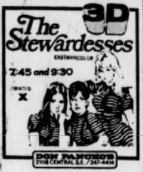 |
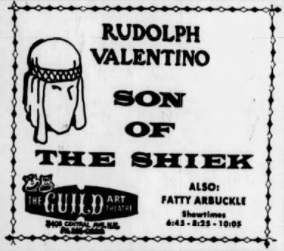
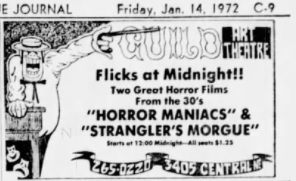 |
|
Tue 11 Jan 1972 |
The Stewardesses (3D, 1969,
Blu-ray) |
Tue 11 Jan 1972 |
Son of the Sheik (1926, CROPPED; premièred at the Sunshine 21 Nov 1926)
SHORT:
Roscoe Arbuckle (which film we do not know, CROPPED) |
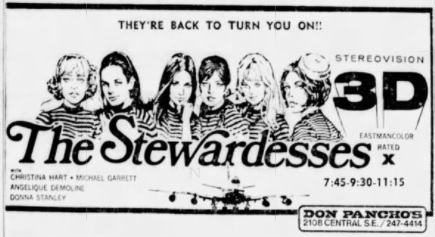 |
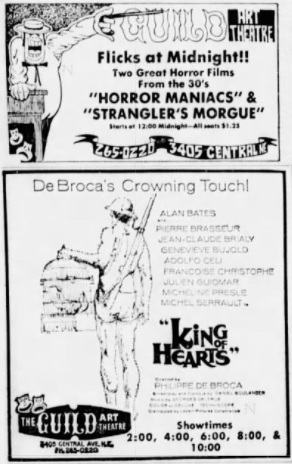 |
|
Fri 14 Jan 1972 |
The Stewardesses (3D, 1969,
Blu-ray) |
Sat 15 Jan 1972 |
King of Hearts (1966; premièred at Don Pancho’s 15 Mar 1968)
MIDNIGHT 15TH:
Horror Maniacs (1948, CROPPED; premièred at the Sunset 18 Oct 1963)
Stranger’s Morgue (1946, CROPPED; premièred at the Sunset 18 Oct 1963) |
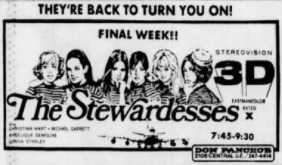 |
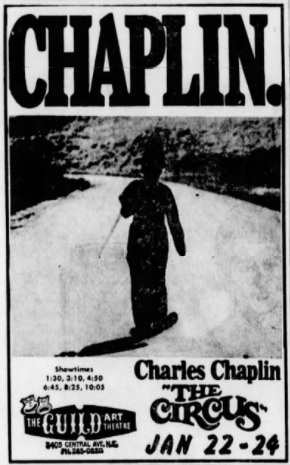
Definitely from the Chaplin estate. See below.
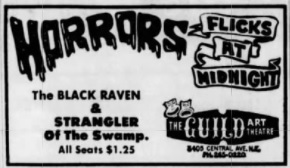 |
|
Fri 21 Jan 1972 |
The Stewardesses (3D, 1969,
Blu-ray) |
Sat 22 Jan 1972 |
The Circus (1928, CROPPED; Albuquerque première of 1969 sound version; silent edition premièred at the KiMo 11 Apr 1928)
MIDNIGHT 22ND:
The Black Raven (1943, CROPPED; premièred at the Rio 08 Jul 1943)
Strangler of the Swamp (1946, CROPPED; premièred at the Rio 11 Jun 1946) |
 |
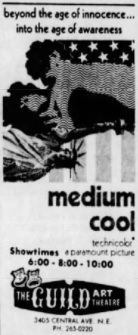 |
|
Tue 25 Jan 1972 |
The Stewardesses (3D, 1969,
Blu-ray) |
Tue 25 Jan 1972 |
Medium Cool (1969; premièred at the KiMo 04 Feb 1970) |
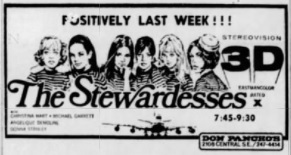 |
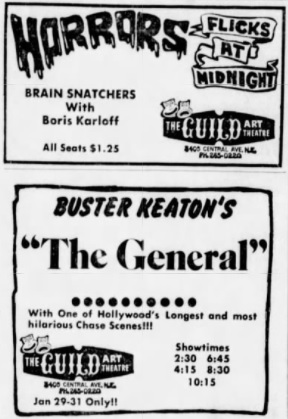 |
|
Fri 28 Jan 1972 |
The Stewardesses (3D, 1969,
Blu-ray) |
Sat 29 Jan 1972 |
The General (11 Dec 1926, CROPPED; premièred at the Pastime 09 Mar 1928)
MIDNIGHT 29TH:
Brain Snatcher (aka The Man Who Lived Again, 1936, CROPPED; premièred at the Rio 11 Dec 1936) |
 |
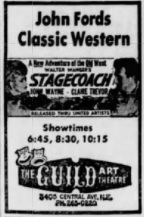
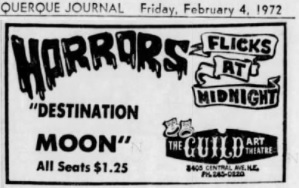 |
|
Tue 01 Feb 1972 |
The Stewardesses (3D, 1969,
Blu-ray) |
Tue 01 Feb 1972 |
Stagecoach (1939, CROPPED; premièred at the KiMo 11 Mar 1939)
MIDNIGHT 4TH:
Destination Moon (CROPPED; premièred at the KiMo 19 Oct 1950) |
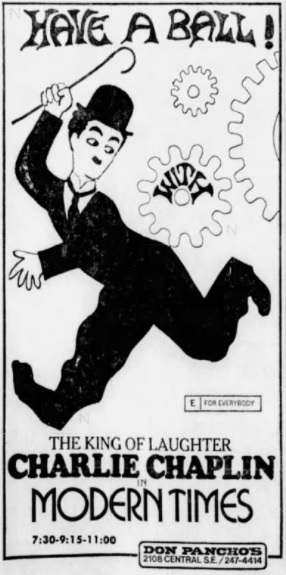 |
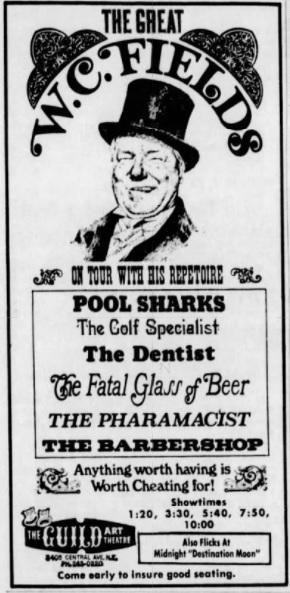 |
|
Fri 04 Feb 1972 |
Modern Times (1936, CROPPED; premièred at the KiMo 25 Apr 1936) |
Sat 05 Feb 1972 |
Pool Sharks (1915, CROPPED; premièred at the Pastime 17 Nov 1915)
The Golf Specialist (1930, CROPPED; premièred at the KiMo 01 Dec 1930)
The Dentist (1932, CROPPED; première was not advertised)
The Fatal Glass of Beer (1933, CROPPED; premièred at the Pastime 19 Sep 1933)
The Pharmacist (1933, CROPPED; première was not advertised)
The Barber Shop (1933, CROPPED; premièred at the Sunshine 23 Aug 1933)
MIDNIGHT 5TH:
Destination Moon (CROPPED; premièred at the KiMo 19 Oct 1950) |
This calls for an explanation.
When the authorities barred Charlie Chaplin from entering the US in 1952, he settled down in Vevey, Switzerland,
and withdrew the movies he owned from release.
In 1959, he created a new movie out of three of his old ones and called it The Chaplin Revue.
He released it around the world but not in the US.
My guess is that no US distributor dared put in a bid, not after all the McCarthy conflagrations.
By 1964, Dean Rusk told Charlie that the US had no objection to his returning, and so Charlie softened.
He reissued Monsieur Verdoux in the US and five years later
he added music and a song to The Circus and put it up for US bids — and he got a bite!
In 1971, Oliver A. Unger (formerly of J.H. Hoffberg Productions) tried to convince Charlie to reissue all of his films.
At first, Charlie couldn’t care less,
but once an investor named Mo Rothman handed him $5,000,000, he got excited by the idea and began reissuing his movies in September 1971.
In March 1972, he returned to the US to accept an Academy Award for Lifetime Achievement,
and that was in conjunction with several of his movies flooding US screens again
(cropped to 1:1.85 and 1:2.00, of course), for the first time since forever.
Donald Pancho’s, normally devoting its schedule to trash,
apparently couldn’t resist the temptation to re-première Charlie’s films in Albuquerque.
|
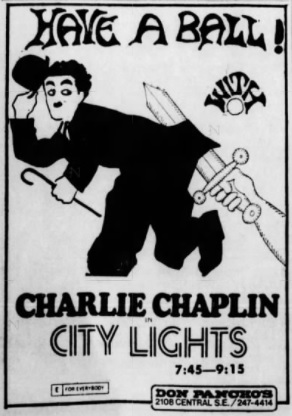 |
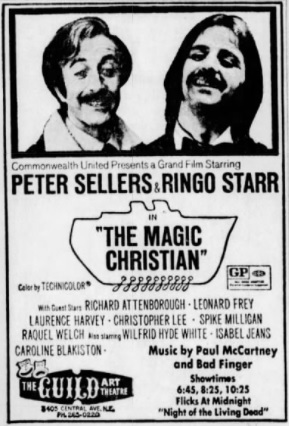 |
|
Fri 18 Feb 1972 |
City Lights (1931, CROPPED; premièred at the KiMo 17 May 1931) |
Fri 18 Feb 1972 |
The Magic Christian (1969; premièred at the Lobo 08 Jul 1970)
MIDNIGHT 18TH & 25TH:
Night of the Living Dead (1968; premièred at the Tesuque and at the Cactus 02 Apr 1969) |
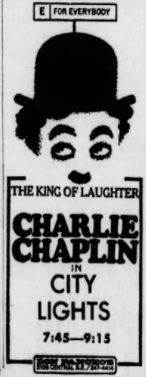 |
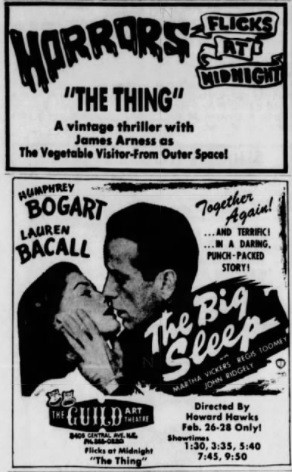 |
|
Fri 25 Feb 1972 |
City Lights (1931, CROPPED; premièred at the KiMo 17 May 1931) |
Sat 26 Feb 1972 |
The Big Sleep (1946, CROPPED; premièred at the KiMo 24 Oct 1946)
MIDNIGHT 26TH:
The Thing (1951, CROPPED; was this the Albuquerque première?) |
 |
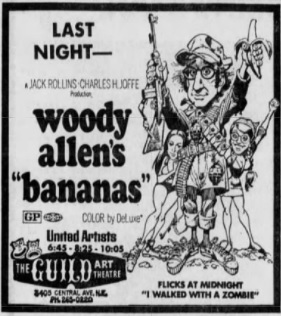 |
|
Tue 29 Feb 1972 |
City Lights (1931, CROPPED; premièred at the KiMo 17 May 1931) |
Tue 29 Feb 1972 |
Bananas (premièred at the Lobo 16 Jun 1971)
MIDNIGHT 3RD:
I Walked with a Zombie (1943, CROPPED; premièred at the Mesa 27 Sep 1943) |
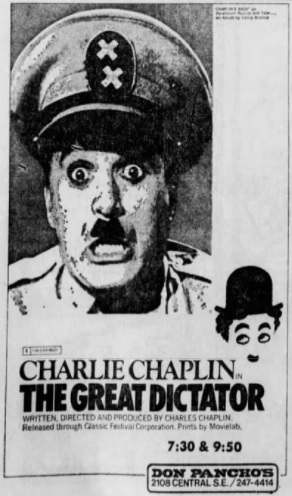 |
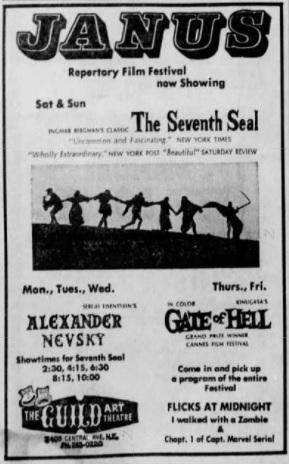 |
|
Fri 03 Mar 1972 |
The Great Dictator (1941, CROPPED; premièred at the KiMo 27 Feb 1942) |
Sat 04 Mar 1972 |
The Seventh Seal (1958, CROPPED, premièred at the SUB 14 May 1960) |
 |
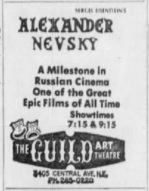 |
|
Mon 06 Mar 1972 |
The Great Dictator (1941, CROPPED; premièred at the KiMo 27 Feb 1942) |
Mon 06 Mar 1972 |
Alexander Nevsky (1938, CROPPED; premièred at the Rodey 01 Apr 1950) |
 |
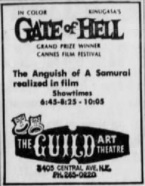 |
|
Thu 09 Mar 1972 |
The Great Dictator (1941, CROPPED; premièred at the KiMo 27 Feb 1942) |
Thu 09 Mar 1972 |
Gate of Hell (1953, CROPPED; premièred at the Lobo 29 Dec 1955) |
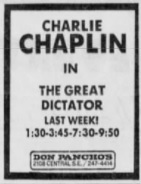 |
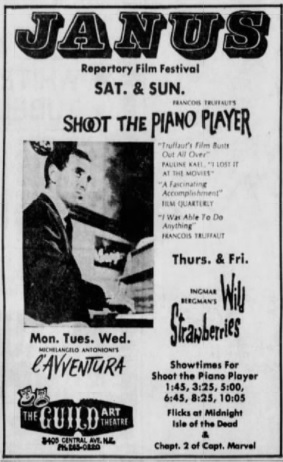 |
|
Sat 11 Mar 1972 |
The Great Dictator (1941, CROPPED; premièred at the KiMo 27 Feb 1942) |
Sat 11 Mar 1972 |
Shoot the Piano Player (1960; premièred at the SUB 20 Sep 1963) |
 |
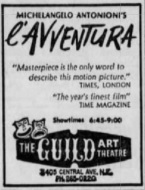 |
|
Mon 13 Mar 1972 |
The Great Dictator (1941, CROPPED; premièred at the KiMo 27 Feb 1942) |
Mon 13 Mar 1972 |
L’avventura (1960; premièred at Don Pancho’s 24 Oct 1963) |
 |
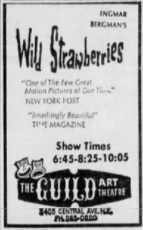 |
|
Thu 16 Mar 1972 |
The Great Dictator (1941, CROPPED; premièred at the KiMo 27 Feb 1942) |
Thu 16 Mar 1972 |
Wild Strawberries (1957, CROPPED, premièred at the Lobo 28 Jan 1960) |
 |
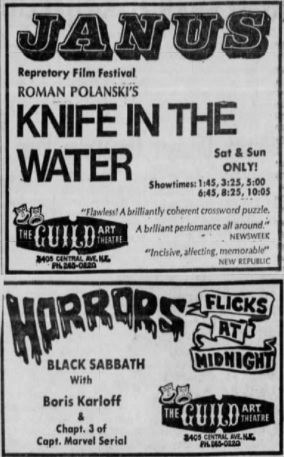 |
|
Fri 17 Mar 1972 |
The Anonymous Venetian (1970; Albuquerque première)
A Man and a Woman (1966; premièred at Don Pancho’s 24 Feb 1967) |
Sat 18 Mar 1972 |
Knife in the Water (1962, CROPPED; premièred at Don Pancho’s 26 Mar 1964)
MIDNIGHT:
Black Sabbath (1963; premièred at the Cactus 30 Apr 1965)
Captain Marvel chapter 3 (1941, CROPPED; premièred at the Mesa 12 Jul 1941) |
 |
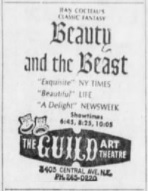 |
|
Mon 20 Mar 1972 |
The Anonymous Venetian (1970)
A Man and a Woman (1966) |
Mon 20 Mar 1972 |
Beauty and the Beast (1946, CROPPED; premièred at UNM 21 Jul 1951) |
 |
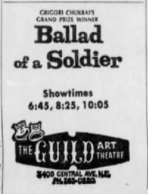 |
|
Thu 23 Mar 1972 |
The Anonymous Venetian (1970)
A Man and a Woman (1966) |
Thu 23 Mar 1972 |
Ballad of a Soldier (1959, CROPPED; premièred at Don Pancho’s 21 Apr 1961) |
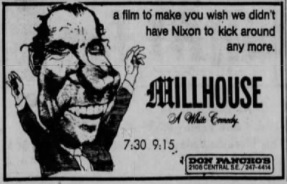 |
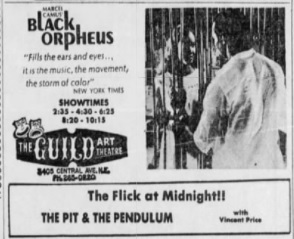 |
|
Fri 24 Mar 1972 |
Millhouse (1971; Albuquerque première) |
Sat 25 Mar 1972 |
Black Orpheus (1959; premièred at the Lobo 12 May 1960)
MIDNIGHT 25TH:
The Pit and the Pendulum (1961; premièred at the Tri-C 08 Nov 1961) |
 |
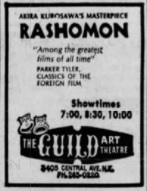 |
|
Mon 27 Mar 1972 |
Millhouse (1971) |
Mon 27 Mar 1972 |
Rashomon (1950, CROPPED; premièred at the Lobo 25 Apr 1952) |
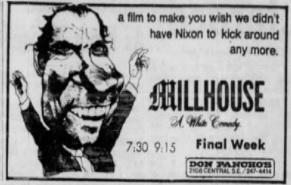 |
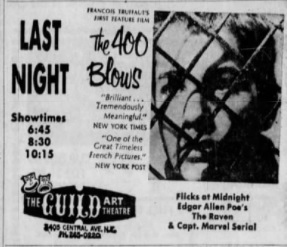 |
|
Thu 30 Mar 1972 |
Millhouse (1971) |
Thu 30 Mar 1972 |
The 400 Blows (1959; premièred at the SUB 10 Aug 1962)
MIDNIGHT 31ST:
The Raven (1935, CROPPED; premièred at the Coronado 12 Jan 1951)
Captain Marvel serial (1941, CROPPED; premièred at the Mesa 12 Jul 1941) |
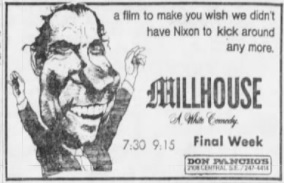 |
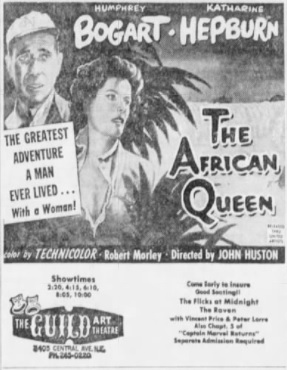 |
|
Sat 01 Apr 1972 |
Millhouse (1971) |
Sat 01 Apr 1972 |
The African Queen (1951, CROPPED; premièred at the KiMo 15 May 1952)
MIDNIGHT 1ST:
The Raven (1935, CROPPED; premièred at the Coronado 12 Jan 1951)
Captain Marvel serial (1941, CROPPED; premièred at the Mesa 12 Jul 1941)
MIDNIGHT 7TH:
The House of Usher (1960; premièred at the KiMo 10 Nov 1960) |
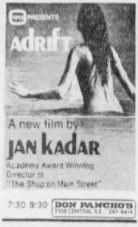 |
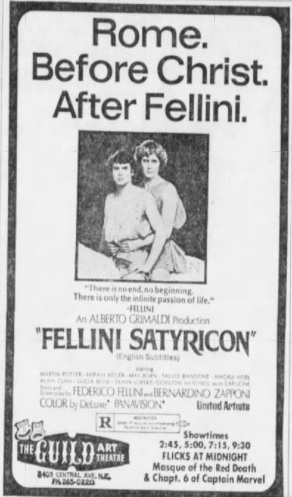 |
|
Fri 07 Apr 1972 |
Adrift (1969; Albuquerque première) |
Sat 08 Apr 1972 |
Fellini-Satyricon (1969; premièred at the Lobo 09 Sep 1970)
MIDNIGHT 8TH:
The Masque of the Red Death (1964; premièred at the State 10 Sep 1964)
Captain Marvel Chapter 6 (1941, CROPPED; premièred at the Mesa 12 Jul 1941) |
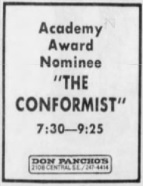 |
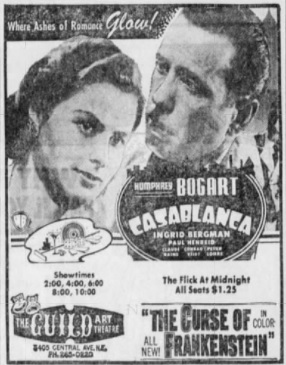 |
|
Fri 14 Apr 1972 |
The Conformist (1970; Albuquerque première) |
Sat 15 Apr 1972 |
Casablanca (1942, CROPPED; premièred at the KiMo 29 Jan 1943)
MIDNIGHT 15TH:
The Curse of Frankenstein (1957; premièred at the KiMo 13 Sep 1957) |
 |
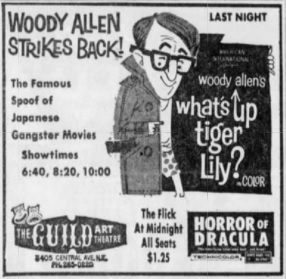 |
|
Tue 18 Apr 1972 |
The Conformist (1970) |
Tue 18 Apr 1972 |
What’s Up, Tiger Lily? (premièred at the Lobo 26 Oct 1966)
MIDNIGHT 21ST:
Horror of Dracula (1958; premièred at the KiMo 01 Aug 1958) |
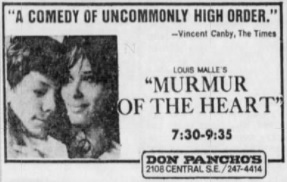 |
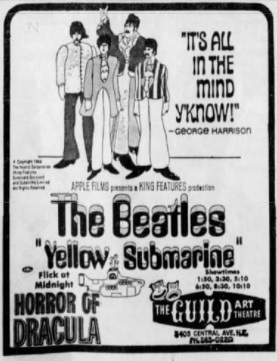 |
|
Fri 21 Apr 1972 |
Murmur of the Heart (1971; Albuquerque première) |
Sat 22 Apr 1972 |
Yellow Submarine (1968; premièred at the Cinema East 28 Jan 1969)
MIDNIGHT 22ND:
Horror of Dracula (1958; premièred at the KiMo 01 Aug 1958)
MIDNIGHT 28TH:
Night of the Living Dead (1968; premièred at the Tesuque and at the Cactus 02 Apr 1969) |
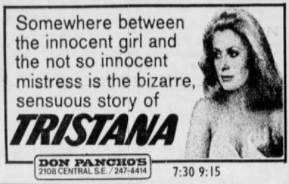 |
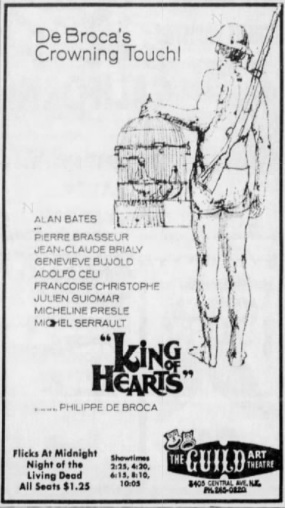 |
|
Fri 28 Apr 1972 |
Tristana (1970; Albuquerque première) |
Sat 29 Apr 1972 |
King of Hearts (1966; premièred at Don Pancho’s 15 Mar 1968)
MIDNIGHT 29TH:
Night of the Living Dead (1968; premièred at the Tesuque and at the Cactus 02 Apr 1969)
MIDNIGHT 5TH:
Casablanca (1942, CROPPED; premièred at the KiMo 29 Jan 1943) |
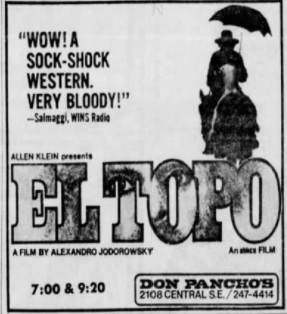 |
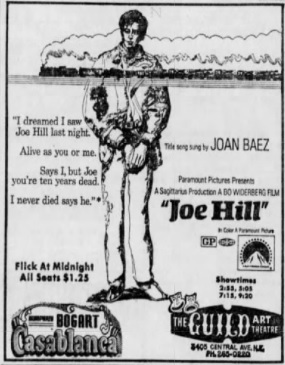
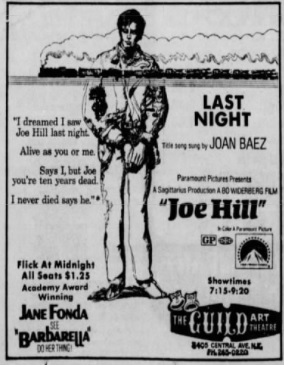 |
|
Fri 05 May 1972 |
El Topo (1970, CROPPED; Albuquerque première) |
Sat 06 May 1972 |
Joe Hill (1971; premièred at the Sunshine 26 Jan 1972)
MIDNIGHT 6TH:
Casablanca (1942, CROPPED; premièred at the KiMo 29 Jan 1943)
MIDNIGHT 12TH:
Barbarella (1968; premièred at the Cinema East 16 Oct 1968) |
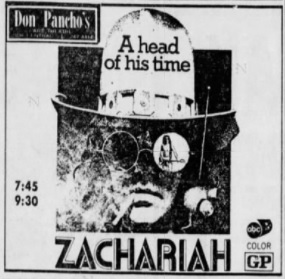 |
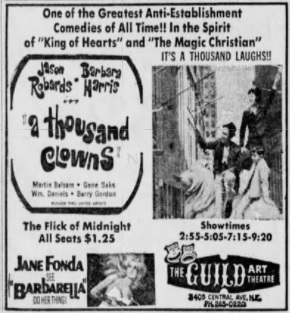 |
|
Fri 12 May 1972 |
Zachariah (1971; premièred at the Cinema East 19 May 1971) |
Sat 13 May 1972 |
A Thousand Clowns (1965; premièred at the Lobo 20 Apr 1966)
MIDNIGHT 13TH:
Barbarella (1968; premièred at the Cinema East 16 Oct 1968) |
 |
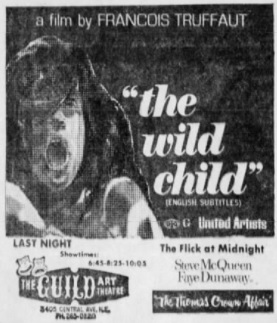 |
|
Tue 16 May 1972 |
Zachariah (1971; premièred at the Cinema East 19 May 1971) |
Tue 16 May 1972 |
The Wild Child (1970; premièred at the Lobo 06 Oct 1971)
MIDNIGHT 19TH:
The Thomas Crown Affair (1968; premièred at the Hiland 18 Sep 1968) |
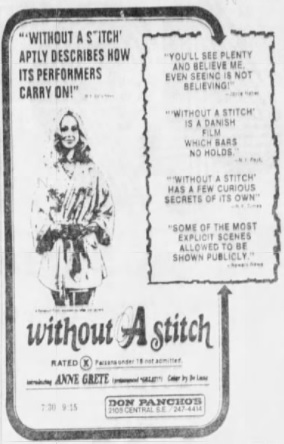 |
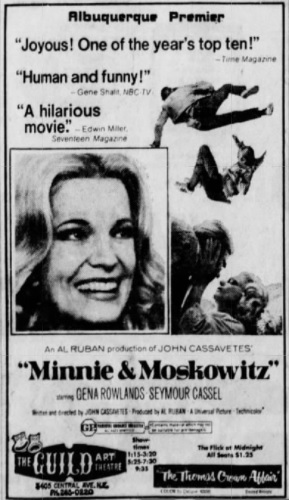
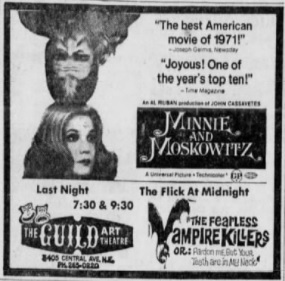 |
|
Fri 19 May 1972 |
Without a Stitch (1968, Sherpix) |
Sat 20 May 1972 |
Minnie and Moskowitz (1971, Albuquerque première)
*
MIDNIGHT 20TH:
The Thomas Crown Affair (1968; premièred at the Hiland 18 Sep 1968)
MIDNIGHT 26TH:
The Fearless Vampire Killers (1967; premièred at the State 31 Jan 1968) |
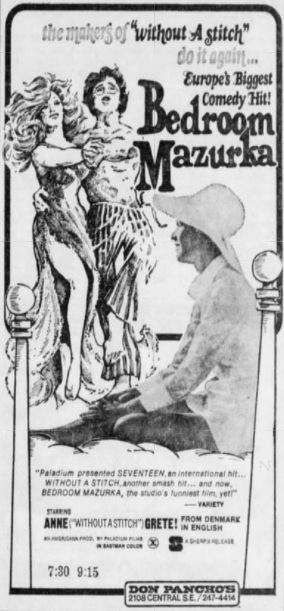 |
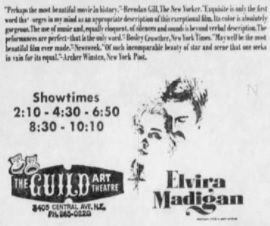
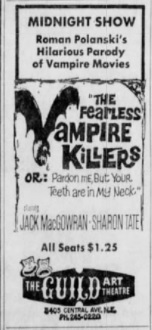 |
|
Fri 26 May 1972 |
Bedroom Mazurka (1970) |
Sat 27 May 1972 |
Elvira Madigan (1967; premièred at the Cinema East 01 May 1968)
MIDNIGHT 27TH:
The Fearless Vampire Killers (1967; premièred at the State 31 Jan 1968) |
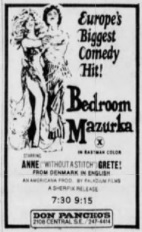 |
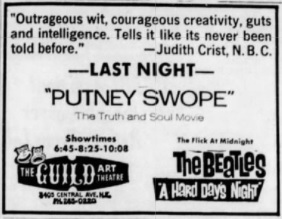 |
|
Tue 30 May 1972 |
Bedroom Mazurka (1970) |
Tue 30 May 1972 |
Putney Swope (1969; premièred at Don Pancho’s 09 Jan 1970)
MIDNIGHT 2ND:
A Hard Day’s Night (premièred at the KiMo 27 Aug 1964) |
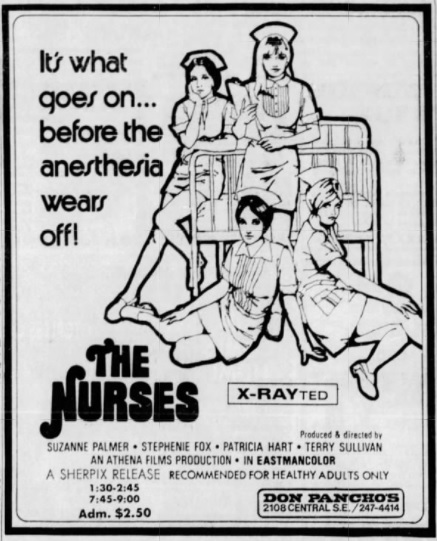 |
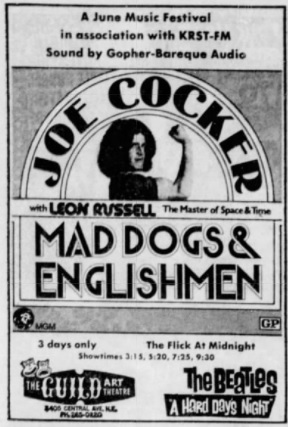 |
|
Fri 02 Jun 1972 |
The Nurses (1971, Sherpix, hardcore) |
Sat 03 Jun 1972 |
Joe Cocker: Mad Dogs & Englishmen (1971; premièred at the Lobo 26 May 1971)
MIDNIGHT 3RD:
A Hard Day’s Night (premièred at the KiMo 27 Aug 1964) |
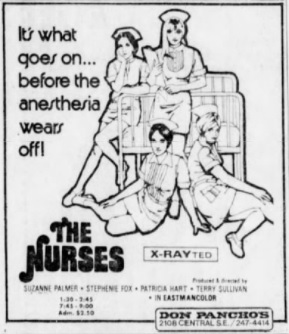 |
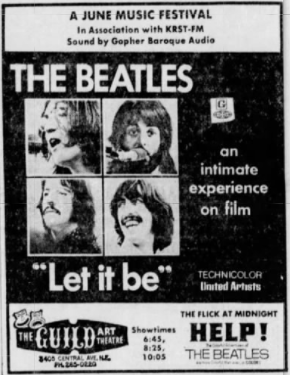 |
|
Tue 06 Jun 1972 |
The Nurses (1971, Sherpix, hardcore) |
Tue 06 Jun 1972 |
Let It Be (1970; premièred at the Hiland 10 Jun 1970)
MIDNIGHT 9TH:
Help! (premièred at the State 26 Aug 1965) |
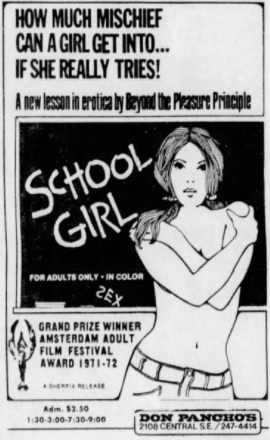 |
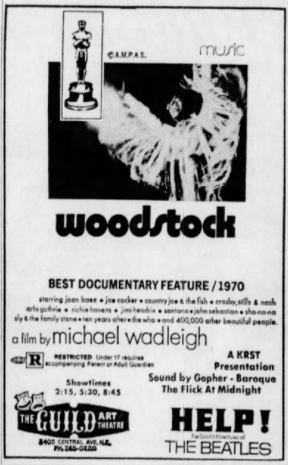 |
|
Fri 09 Jun 1972 |
School Girl (1971, Sherpix, hardcore) |
Sat 10 Jun 1972 |
Woodstock (1970; premièred at the Hiland 22 Jul 1970)
MIDNIGHT 10TH:
Help! (premièred at the State 26 Aug 1965) |
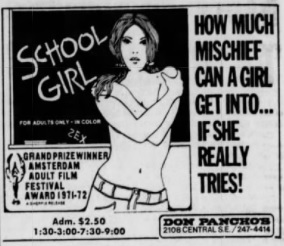 |
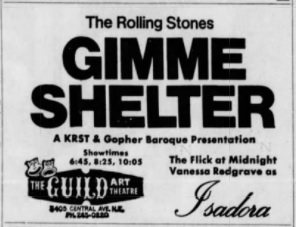 |
|
Tue 13 Jun 1972 |
School Girl (1971, Sherpix, hardcore) |
Tue 13 Jun 1972 |
Gimme Shelter (1970; premièred at Don Pancho’s 10 Sep 1971)
MIDNIGHT 13TH:
Isadora (premièred at the Sunshine 17 Dec 1969) |
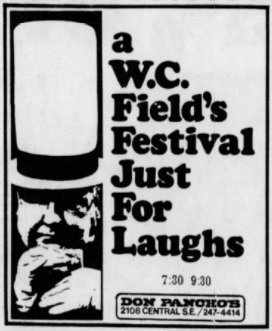 |
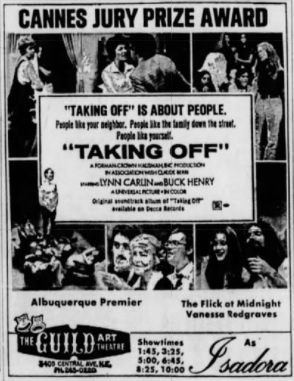
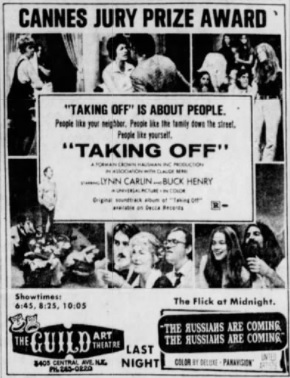 |
|
Fri 16 Jun 1972 |
A Night with the Great One (CROPPED) |
Sat 17 Jun 1972 |
Taking Off (1971; Albuquerque première)
MIDNIGHT 17TH:
Isadora (premièred at the Sunshine 17 Dec 1969)
MIDNIGHT 23RD:
The Russians Are Coming! The Russians Are Coming! (premièred at the Cinema East 13 Jun 1966) |
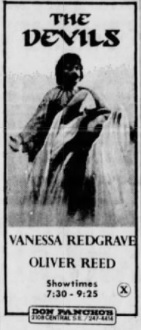 |
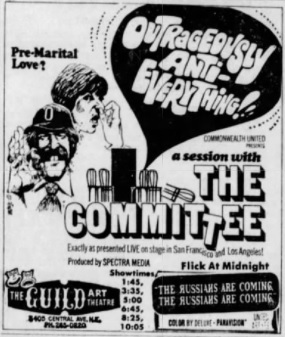 |
|
Fri 23 Jun 1972 |
The Devils (1971; premièred at the Sunshine 09 Feb 1972) |
Sat 24 Jun 1972 |
A Session with The Committee (1969; was this the Albuquerque première?)
MIDNIGHT 27TH:
The Russians Are Coming! The Russians Are Coming! (premièred at the Cinema East 13 Jun 1966) |
 |
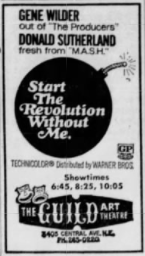 |
|
Tue 27 Jun 1972 |
The Devils (1971; premièred at the Sunshine 09 Feb 1972) |
Tue 27 Jun 1972 |
Start the Revolution without Me (1970; Albuquerque première) |
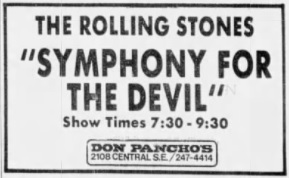 |
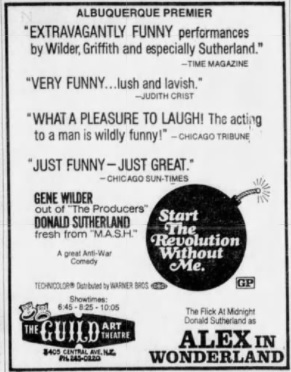 |
|
Fri 30 Jun 1972 |
Sympathy for the Devil (1968; Albuquerque première) |
Fri 30 Jun 1972 |
Start the Revolution without Me (1970)
MIDNIGHT 30TH AND 1ST:
Alex in Wonderland (1970; premièred at the Fox 10 Mar 1971) |
 |
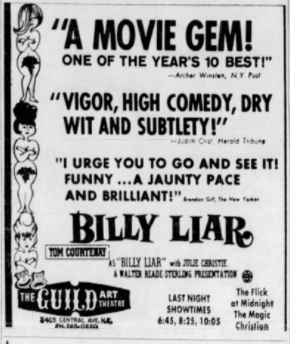 |
|
Tue 04 Jul 1972 |
Sympathy for the Devil (1968) |
Tue 04 Jul 1972 |
Billy Liar (1963; premièred at the Lobo 30 Jan 1964)
MIDNIGHT 7TH:
The Magic Christian (1969; premièred at the Lobo 08 Jul 1970) |
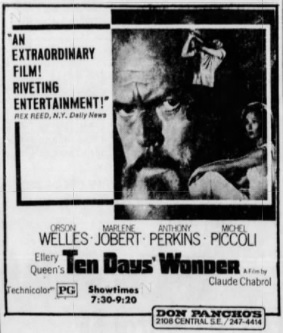 |
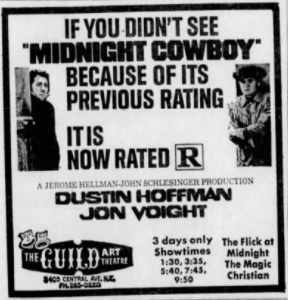 |
|
Fri 07 Jul 1972 |
Ten Days’ Wonder (1971; Albuquerque première) |
Sat 08 Jul 1972 |
Midnight Cowboy (premièred at the Lobo 20 Aug 1969)
MIDNIGHT 8TH:
The Magic Christian (1969; premièred at the Lobo 08 Jul 1970) |
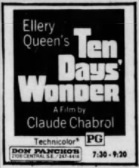 |
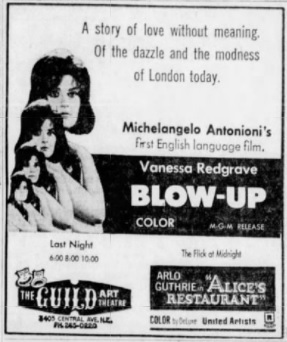 |
|
Tue 11 Jul 1972 |
Ten Days’ Wonder (1971) |
Tue 11 1972 |
Blow-Up (1966; premièred at Don Pancho’s 31 Mar 1967)
MIDNIGHT 14TH:
Alice’s Restaurant (premièred at the Lobo 15 Oct 1969) |
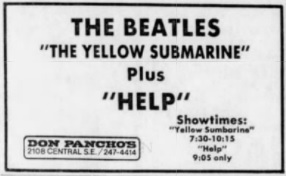 |
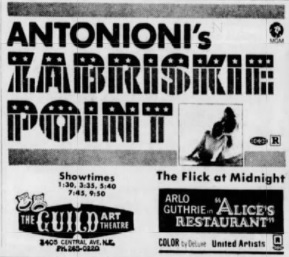 |
|
Fri 14 Jul 1972 |
Yellow Submarine (1968; premièred at the Cinema East 28 Jan 1969)
Help! (premièred at the State 26 Aug 1965) |
Sat 15 Jul 1972 |
Zabriskie Point (premièred at the Lobo 22 Apr 1970) |
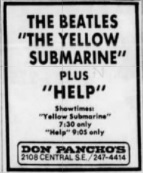 |
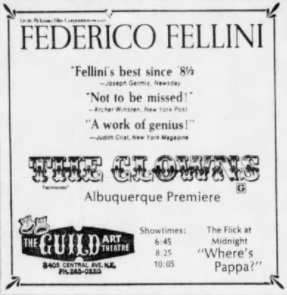 |
|
Tue 18 Jul 1972 |
Yellow Submarine (1968; premièred at the Cinema East 28 Jan 1969)
Help! (premièred at the State 26 Aug 1965) |
Tue 18 Jul 1972 |
The Clowns (1970, Albuquerque première, CROPPED)
MIDNIGHT 21ST:
Where’s Poppa? (premièred at the Lobo 30 Dec 1970) |
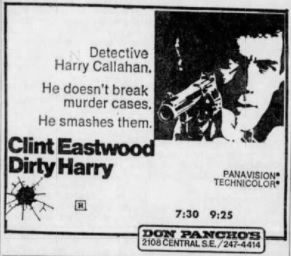 |
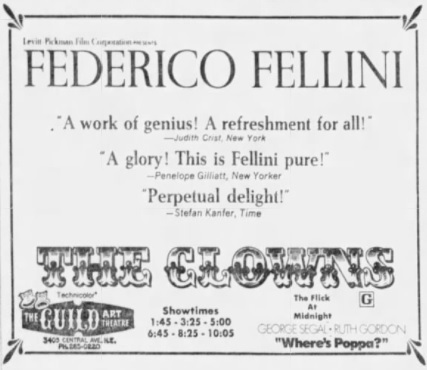 |
|
Fri 21 Jul 1972 |
Dirty Harry (1971; premièred at the Fox 19 Jan 1972) |
Sat 22 Jul 1972 |
The Clowns (1970, Albuquerque première, CROPPED)
MIDNIGHT 21ST:
Where’s Poppa? (premièred at the Lobo 30 Dec 1970) |
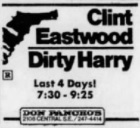 |
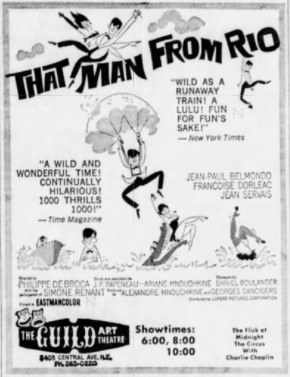 |
|
Tue 25 Jul 1972 |
Dirty Harry (1971; premièred at the Fox 19 Jan 1972) |
Tue 25 Jul 1972 |
That Man from Rio (1964; premièred at the Lobo 21 Jan 1965)
MIDNIGHT 28TH:
The Circus (1928, CROPPED; silent edition premièred at the KiMo 11 Apr 1928; sound edition premièred at the Guild 22 Jan 1972) |
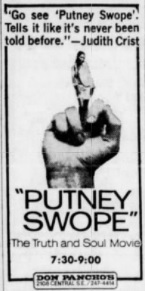 |
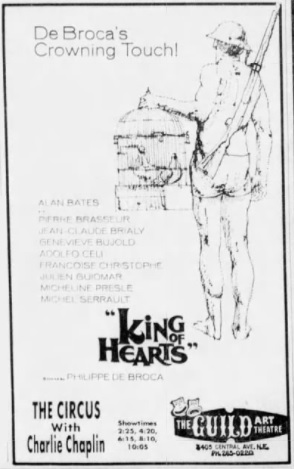 |
|
Fri 28 Jul 1972 |
Putney Swope (1969; premièred at Don Pancho’s 09 Jan 1970) |
Sat 29 Jul 1972 |
King of Hearts (1966; premièred at Don Pancho’s 15 Mar 1968)
MIDNIGHT 28TH:
The Circus (1928, CROPPED; silent edition premièred at the KiMo 11 Apr 1928; sound edition premièred at the Guild 22 Jan 197) |
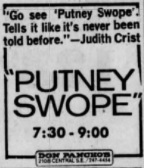 |
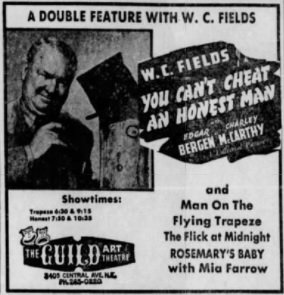 |
|
Tue 01 Aug 1972 |
Putney Swope (1969; premièred at Don Pancho’s 09 Jan 1970) |
Tue 01 Aug 1972 |
You Can’t Cheat an Honest Man (1939, CROPPED; premièred at the KiMo 29 Apr 1939)
Man on the Flying Trapeze (1935, CROPPED; premièred at the Sunshine 20 Aug 1935)
MIDNIGHT 4TH AND 5TH:
Rosemary’s Baby (1968) |
|
The ATGoA had tried second run at Donald Pancho’s, and it had tried adult stuff, and it had even tried copycatting The Guild,
but apparently nothing worked.
So now it went back to where the money was: porn, exclusively.
This new program lasted for nearly half a year, and it must have tanked.
The college kids wanted something different, and so they all flocked to the dumpy closet-sized cinema a mile east.
Eventually, the ATGoA got the message.
|
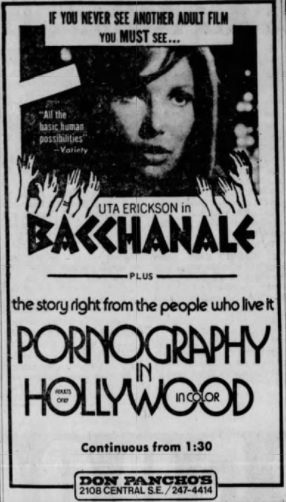 |
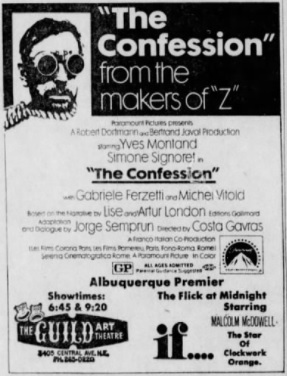 |
|
Fri 04 Aug 1972 |
Bacchanale (1970, hardcore)
Pornography in Hollywood (1972, hardcore)
|
Tue 08 Aug 1972 |
The Confession (1970; Albuquerque première)
MIDNIGHT 11TH AND 12TH:
if.... (1969; premièred at the Lobo 25 Jun 1969) |
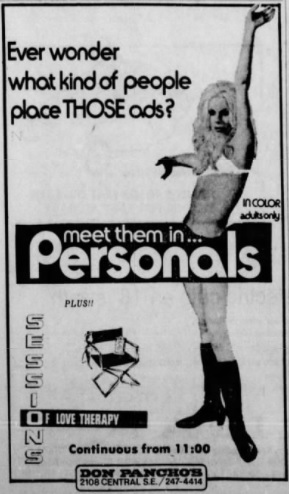 |
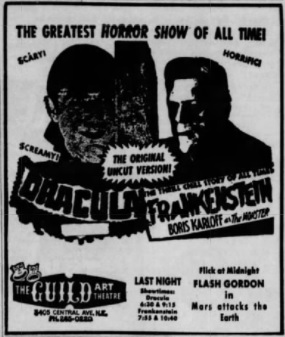 |
|
Fri 11 Aug 1972 |
Personals (1972, hardcore)
Sessions of Love Therapy (1971, hardcore) |
Tue 15 Aug 1972 |
Frankenstein (1931, CROPPED; premièred at the KiMo 10 Jan 1932)
Dracula (1931, CROPPED; premièred at the Mission 14 Mar 1931)
MIDNIGHT 18TH:
Flash Gordon: Mars Attacks the Earth (1938, CROPPED; original serial premièred at the Mesa 18 Mar 1938) |
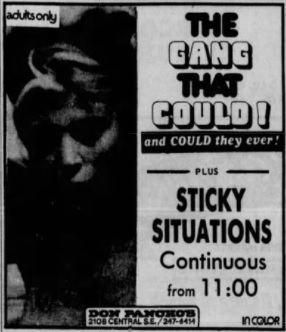 |
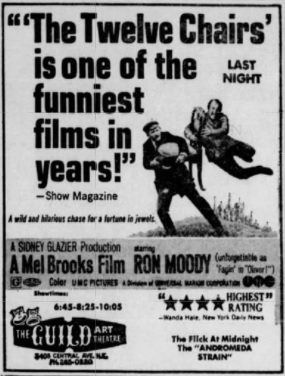 |
|
Fri 18 Aug 1972 |
The Gang That Could! (1971, hardcore)
A Sticky Situation (1972, hardcore) |
Tue 22 Aug 1972 |
The Twelve Chairs (1970; Albuquerque première)
MIDNIGHT 25TH AND 26TH:
The Andromeda Strain (premièred at the Cinema East 26 May 1971) |
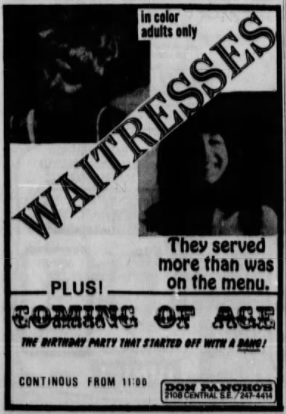 |
 |
|
Fri 25 Aug 1972 |
Waitresses (1971, hardcore)
Coming of Age (1971, gay porn, dir: Brad Kingston) |
Tue 29 Aug 1972 |
Sacco & Vanzetti (1971; Albuquerque première)
MIDNIGHT 1ST AND 2ND:
The Manchurian Candidate (1962; premièred at the Terrace 14 Nov 1962) |
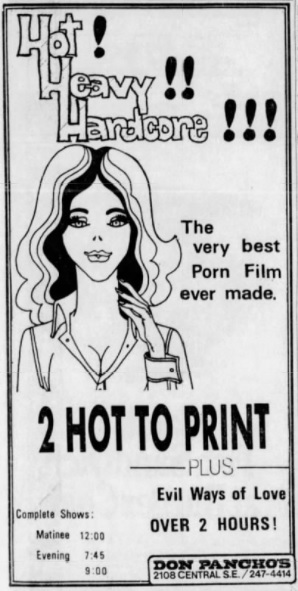 |
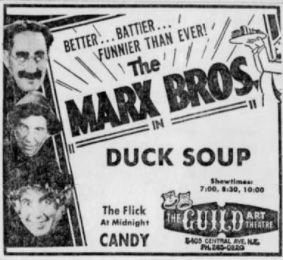 |
|
Fri 01 Sep 1972 |
Deep Throat (1972, hardcore)
Evil Ways of Love (1972, hardcore?) |
Tue 05 Sep 1972 |
Duck Soup (1933, CROPPED; premièred at the Sunshine 18 Nov 1933)
MIDNIGHT 8TH AND 9TH:
Candy (1968; premièred at the Fox 25 Dec 1968) |
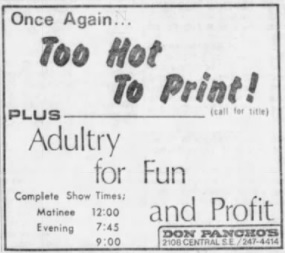 |
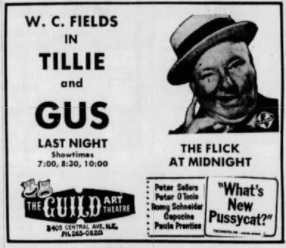 |
|
Fri 08 Sep 1972 |
Deep Throat (1972, hardcore)
Adultery for Fun & Profit (1971, Sherpix, hardcore) |
Tue 12 Sep 1972 |
Tillie and Gus (premièred at the Mission 26 Nov 1933)
MIDNIGHT 15TH AND 16TH:
What’s New, Pussycat? (premièred at the Cinema East 30 Jun 1965) |
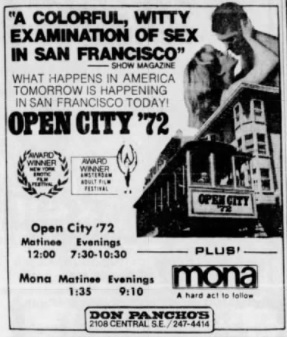 |
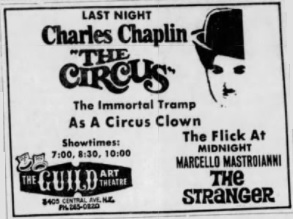 |
|
Fri 15 Sep 1972 |
Open City ’72 (1972)
Mona (1970, hardcore) |
Wed 20 Sep 1972 |
The Circus (1928; silent première KiMo 11 Apr 1928; sound première Guild 22 Jan 1972)
MIDNIGHT 22ND AND 23RD:
The Stranger (1967; premièred at Don Pancho’s 08 Nov 1968) |
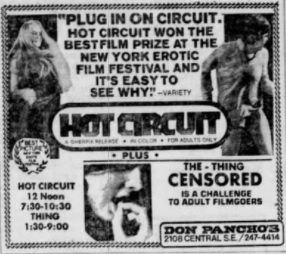 |
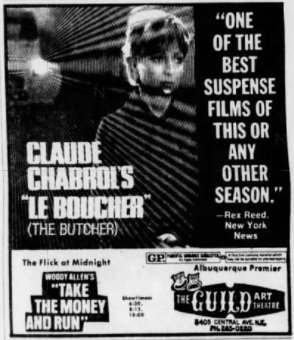 |
|
Fri 22 Sep 1972 |
Hot Circuit (1971, hardcore)
The Coming Thing (1970, hardcore) |
Tue 26 Sep 1972 |
Le boucher (1970, Albuquerque première)
MIDNIGHT 29TH AND 30TH:
Take the Money and Run (1969; premièred at the Lobo 09 Oct 1970) |
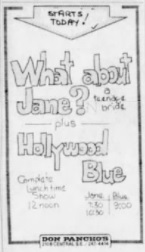 |
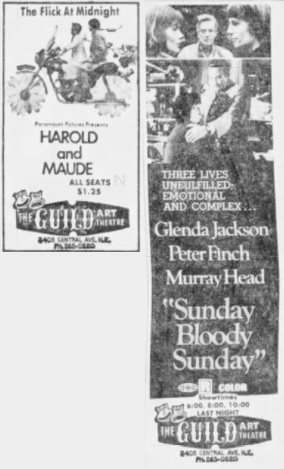 |
|
Fri 29 Sep 1972 |
What about Jane? (1972, hardcore)
Hollywood Blue (1970, hardcore) |
Tue 03 Oct 1972 |
Sunday Bloody Sunday (1971; premièred at the Cinema East 17 May 1972)
MIDNIGHT 28TH AND 29TH:
Harold and Maude (1971; premièred at the Fox 11 Feb 1972) |
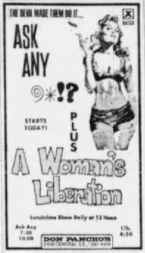 |
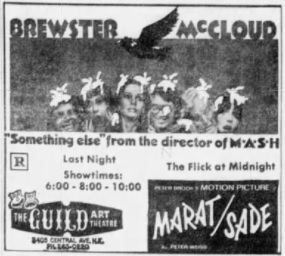 |
|
Tue 06 Oct 1972 |
Ask Any Hooker (1972, hardcore?)
A Woman’s Liberation (1972, hardcore?) |
Tue 10 Oct 1972 |
Brewster McCloud (premièred at the Lobo 27 Jan 1971)
MIDNIGHT 13TH:
Marat/Sade (1967; premièred at the Hiland 14 May 1968) |
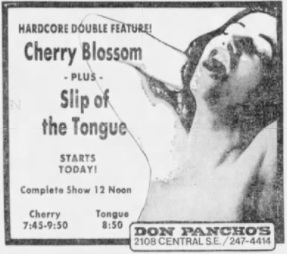 |
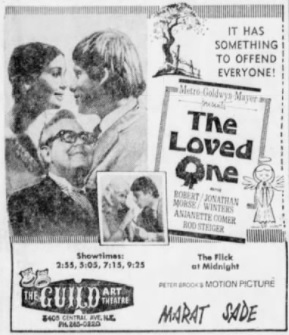 |
|
Fri 13 Oct 1972 |
Cherry Blossom (1972, hardcore?)
Slip of the Tongue (1971, hardcore?) |
Sat 14 Oct 1972 |
The Loved One (1965; premièred at the Lobo 23 Mar 1966)
MIDNIGHT 14TH:
Marat/Sade (1967; premièred at the Hiland 14 May 1968) |
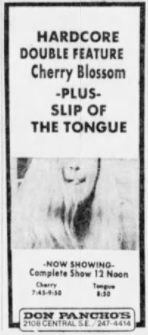 |
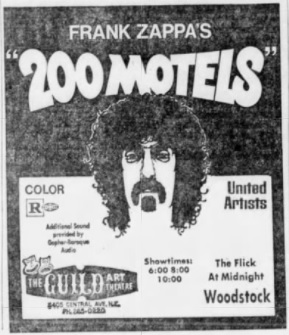 |
|
Tue 17 Oct 1972 |
Cherry Blossom (1972, hardcore?)
Slip of the Tongue (1971, hardcore?) |
Tue 17 Oct 1972 |
200 Motels (1971, CROPPED; premièred at the Lobo 29 Mar 1972)
MIDNIGHT 28TH:
Woodstock (1970; premièred at the Hiland 22 Jul 1970) |
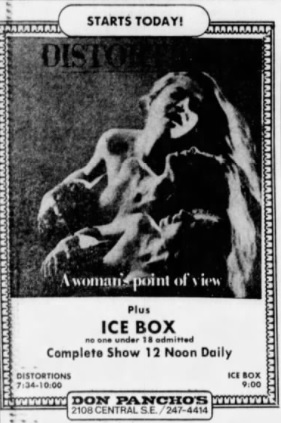 |
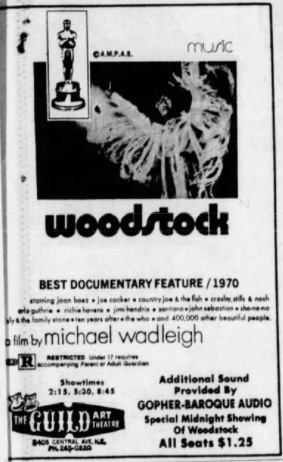 |
|
Fri 20 Oct 1972 |
Distortions of Sexuality (1972, hardcore)
The Ice Box (1971) |
Sat 21 Oct 1972 |
Woodstock (1970; premièred at the Hiland 22 Jul 1970) |
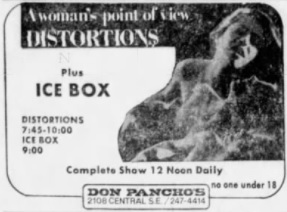 |
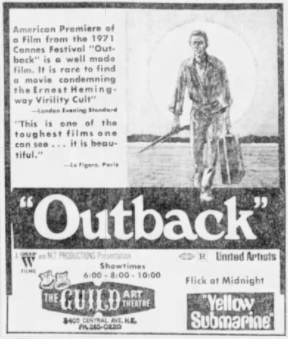 |
|
Tue 24 Oct 1972 |
Distortions of Sexuality (1972, hardcore)
The Ice Box (1971) |
Tue 24 Oct 1972 |
Outback (aka Wake in Fright, 1971; premièred at the State 13 Oct 1971)
MIDNIGHT 27TH:
Yellow Submarine (1968; premièred at the Cinema East 28 Jan 1969) |
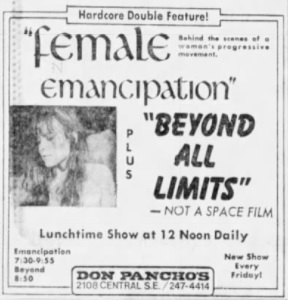 |
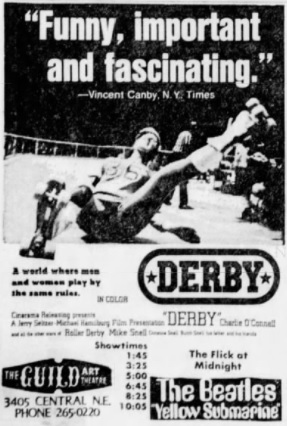 |
|
Fri 27 Oct 1972 |
Female Sexual Emancipation (1970, hardcore?)
Beyond All Limits (1970, hardcore) |
Tue 28 Oct 1972 |
Derby (1971; Albuquerque première)
MIDNIGHT 28TH:
Yellow Submarine (1968; premièred at the Cinema East 28 Jan 1969) |
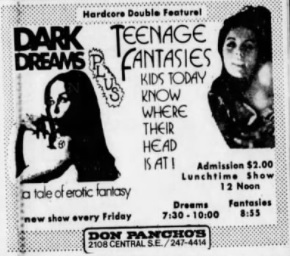 |
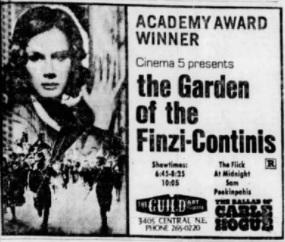 |
|
Fri 03 Nov 1972 |
Dark Dreams (1971, hardcore)
Teenage Fantasies (1972, hardcore) |
Sat 04 Nov 1972 |
The Garden of the Finzi Continis
(1970; premièred at the Lobo 31 May 1972)
MIDNIGHT 3RD AND 4TH:
The Ballad of Cable Hogue (premièred at the KiMo and Cactus 29 Apr 1970) |
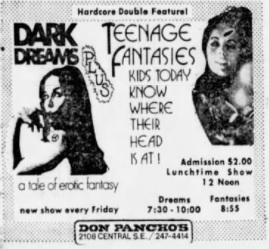 |
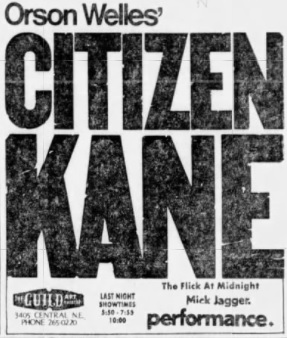 |
|
Tue 07 Nov 1972 |
Dark Dreams (1971, hardcore)
Teenage Fantasies (1972, hardcore) |
Tue 07 Nov 1972 |
Citizen Kane (1941, CROPPED; premièred at the KiMo 16 Nov 1941)
MIDNIGHT 10TH:
Performance (1970; premièred at the Lobo 04 Nov 1970) |
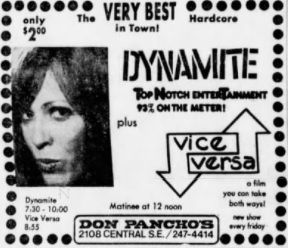 |
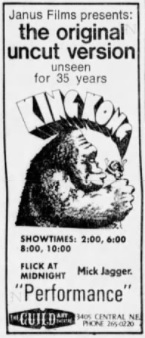 |
|
Tue 10 Nov 1972 |
Dynamite (1972, hardcore)
Vice Versa! (1971, hardcore) |
Sat 11 Nov 1972 |
King Kong (1933; premièred at the KiMo 23 Apr 1933)
MIDNIGHT 11TH:
Performance (1970; premièred at the Lobo 04 Nov 1970) |
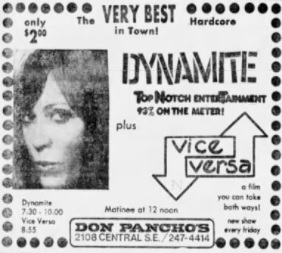 |
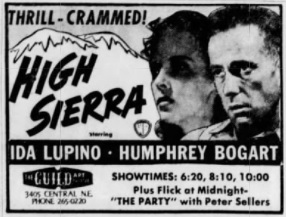 |
|
Tue 14 Nov 1972 |
Dynamite (1972, hardcore)
Vice Versa! (1971, hardcore) |
Tue 14 Nov 1972 |
High Sierra (1941, CROPPED; premièred at the KiMo 02 Feb 1941)
MIDNIGHT 17TH:
The Party (premièred at the Cinema East 10 Apr 1968) |
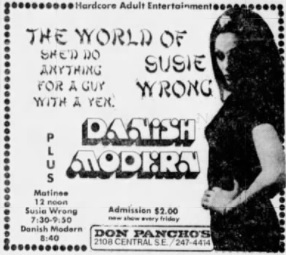 |
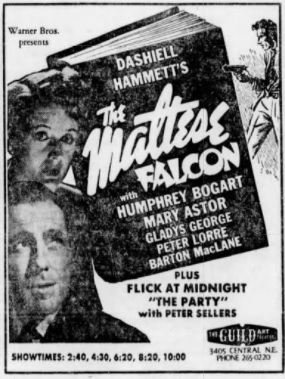 |
|
Fri 17 Nov 1972 |
The World of Susie Wrong (1972, no info)
Danish Modern (1972, hardcore?) |
Sat 18 Nov 1972 |
The Maltese Falcon (1941, CROPPED; premièred at the KiMo 20 Nov 1941)
MIDNIGHT 18TH:
The Party (premièred at the Cinema East 10 Apr 1968) |
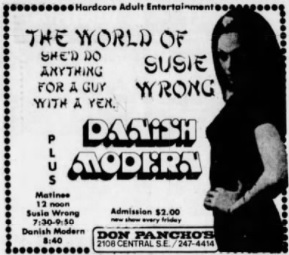 |
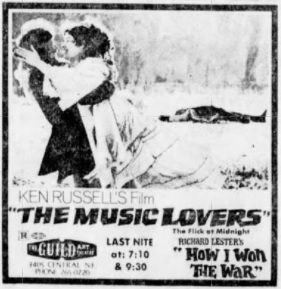 |
|
Tue 21 Nov 1972 |
The World of Susie Wrong (1972, no info)
Danish Modern (1972, hardcore?) |
Tue 21 Nov 1972 |
The Music Lovers (1970; premièred at the Lobo 13 Oct 1971)
MIDNIGHT 24TH:
How I Won the War (1967; premièred at the Lobo 06 Mar 1968) |
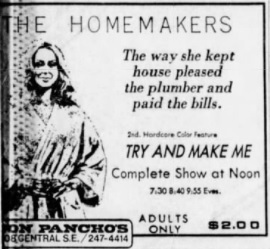 |
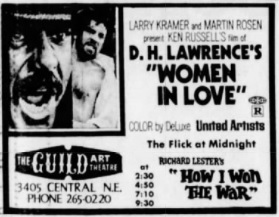 |
|
Fri 24 Nov 1972 |
The Homemakers (1971, hardcore?)
Try and Make Me (1970, hardcore) |
Sat 25 Nov 1972 |
Women in Love (1969; premièred at Loew’s 15 May 1970)
MIDNIGHT 28TH:
How I Won the War (1967; premièred at the Lobo 06 Mar 1968) |
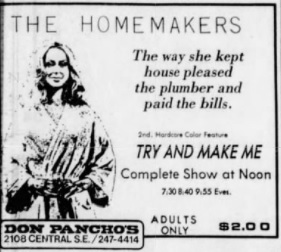 |
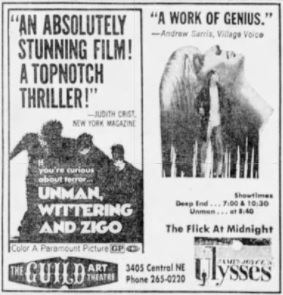 |
|
Tue 28 Nov 1972 |
The Homemakers (1971, hardcore?)
Try and Make Me (1970, hardcore) |
Tue 28 Nov 1972 |
Unman, Wittering and Zigo (1971; Albuquerque première)
Deep End (1970; premièred at the Sunshine 26 Jan 1972)
MIDNIGHT 1ST:
James Joyce’s Ulysses (1967; premièred at the Cinema East 27 Mar 1968 — the display ad read, “Now for the First Time at Popular Prices,” but I don’t think there was a previous screening locally) |
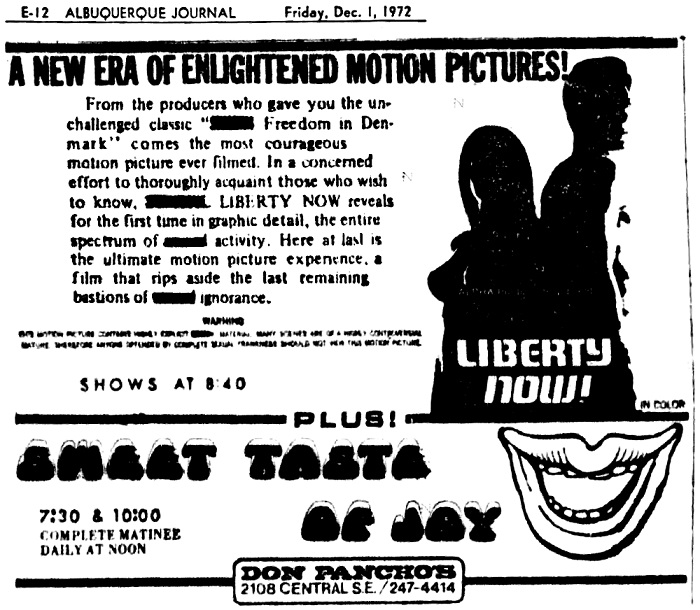 |
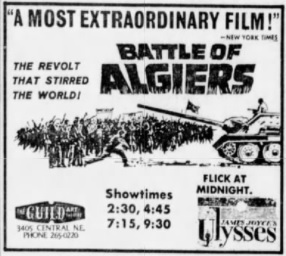 |
|
Fri 01 Dec 1972 |
Sexual Liberty Now (1971, hardcore)
Sweet Taste of Joy (1970, hardcore) |
Sat 02 Dec 1972 |
The Battle of Algiers (1966; premièred at Don Pancho’s 03 May 1968)
MIDNIGHT 2ND:
James Joyce’s Ulysses (1967; premièred at the Cinema East 27 Mar 1968 — the display ad read, “Now for the First Time at Popular Prices,” but I don’t think there was a previous screening locally) |
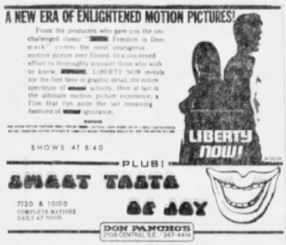 |
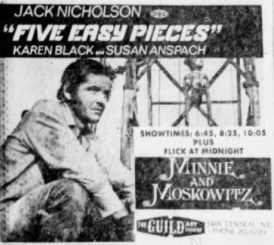 |
|
Tue 05 Dec 1972 |
Sexual Liberty Now (1971, hardcore)
Sweet Taste of Joy (1970, hardcore) |
Tue 05 Dec 1972 |
Five Easy Pieces (1970; premièred at the Lobo 24 Feb 1971)
MIDNIGHT 8TH:
Minnie and Moskowitz (1971; premièred at the Guild 20 May 1972) |
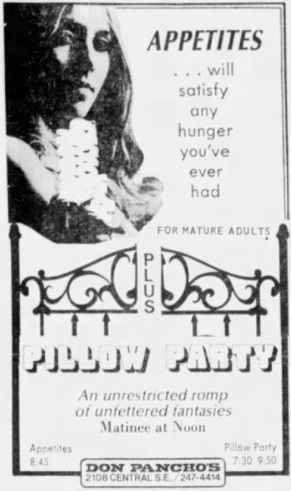 |

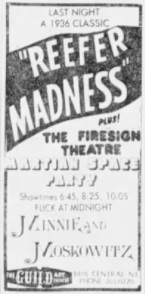 |
|
Fri 08 Dec 1972 |
Appetites (1967)
Pillow Party (1970, hardcore?) |
Sat 09 Dec 1972 |
Reefer Madness (1936; CROPPED, Albuquerque première)
SHORT:
Martian Space Party (1972; Albuquerque première)
MIDNIGHT 9TH:
A Shot in the Dark (1964; premièred at the Hiland 10 Sep 1964)
MIDNIGHT 15TH:
Minnie and Moskowitz (1971; premièred at the Guild 20 May 1972) |
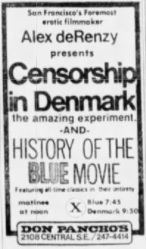 |
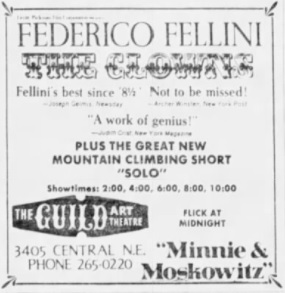 |
|
Fri 15 Dec 1972 |
Censorship in Denmark (1970, hardcore)
History of the Blue Movie (1970, Sherpix, hardcore) |
Sat 16 Dec 1972 |
The Clowns (1970, CROPPED; premièred at the Guild 22 Jul 1972)
MIDNIGHT 16TH:
Minnie and Moskowitz (1971; premièred at the Guild 20 May 1972) |
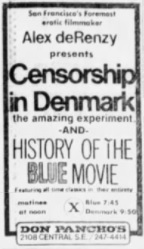 |
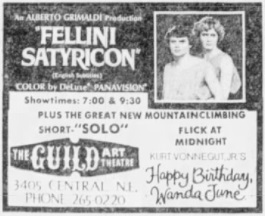 |
|
Tue 19 Dec 1972 |
Censorship in Denmark (1970, hardcore)
History of the Blue Movie (1970, Sherpix, hardcore) |
Tue 19 Dec 1972 |
Fellini-Satyricon (1969; premièred at the Lobo 09 Sep 1970)
SHORT:
Solo (1972)
MIDNIGHT 28TH:
Happy Birthday, Wanda June (1971; Albuquerque première?) |
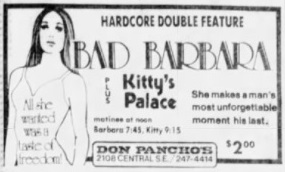 |
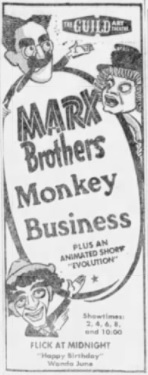
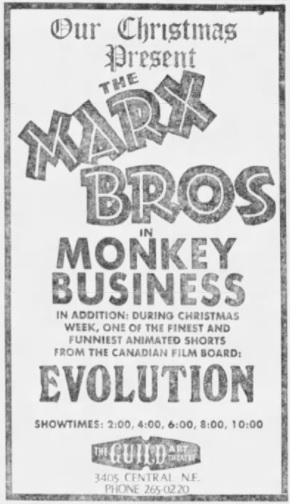 |
|
Fri 22 Dec 1972 |
Bad Barbara (1972, Sherpix, hardcore?)
Kitty’s Pleasure Palace (aka Climax, 1971, hardcore) |
Sat 23 Dec 1972 |
Monkey Business (1931, CROPPED; premièred at the Sunshine 19 Sep 1931)
SHORT:
Evolution (1971)
MIDNIGHT 23RD:
Happy Birthday, Wanda June (1971; Albuquerque première?) |
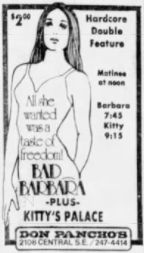 |
For whatever it’s worth, Friday, 29 December 1972, was the first time I attended The Guild,
because my parents unexpectedly agreed to drop me off to see The Cocoanuts and to pick me up again afterwards.
Everything about the movie and everything about the presentation confused me.
It was not until three years later that I understood the presentation,
and it was not until April 2020 that I understood exactly how Paramount Pictures entirely butchered the movie prior to release
and then took no care to preserve it.
I wrote about all that here.
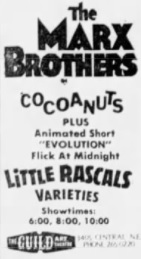
|
|
Tue 26 Dec 1972 |
Bad Barbara (1972, Sherpix, hardcore?)
Kitty’s Pleasure Palace (aka Climax, 1971, hardcore) |
Tue 26 Dec 1972 |
The Cocoanuts (1929, CROPPED; premièred at the Sunshine 31 Aug 1929)
SHORT:
Evolution (1971)
MIDNIGHT 29TH:
Little Rascals Varieties (1959, CROPPED; premièred at the State 22 Jul 1959) |
|
This puzzles me.
My best guess is that this was the only program cheaply available that week, and so Don Pancho’s just took what it could get.
There is another possumbility, though.
Perhaps this was a test.
Though I have no box-office reports and no eyewitness reports,
I am certain that Reefer Madness was quite successful when it played at The Guild three weeks earlier.
Why am I certain?
Because Reefer Madness became a Movie, Inc., staple.
Perhaps ATGoA was wondering if it would work the same magic at Don Pancho’s?
Whatever the case, after this single week, Don Pancho’s returned to its regular porn programming, but for just a few more weeks.
Don Pancho’s was on the cusp of declaring war.
| 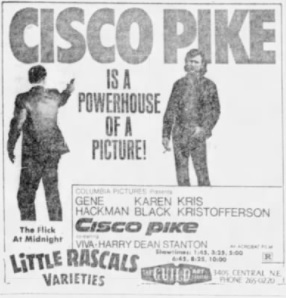
 |
|
Fri 29 Dec 1972 |
Reefer Madness (1936; premièred at the Guild 09 Dec 1972)
SHORT:
Martian Space Party (1972; premièred at the Guild 09 Dec 1972) |
Sat 30 Dec 1972 |
Cisco Pike (1972; premièred at the Lobo 08 Sep 1972)
MIDNIGHT 30TH:
Little Rascals Varieties (1959, CROPPED; premièred at the State 22 Jul 1959)
MIDNIGHT 5TH:
Performance (1970; premièred at the Lobo 04 Nov 1970) |
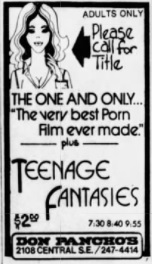 |
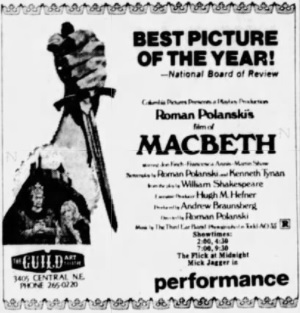 |
|
Fri 05 Dec 1973 |
Deep Throat (1972, hardcore)
Teenage Fantasies (1972, hardcore) |
Sat 06 Jan 1973 |
Macbeth (1971; Albuquerque première)
MIDNIGHT 6TH:
Performance (1970; premièred at the Lobo 04 Nov 1970)
MIDNIGHT 12TH:
The Magic Christian (1969; premièred at the Lobo 08 Jul 1970) |
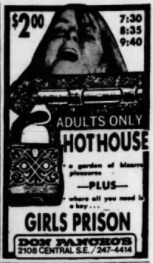 |
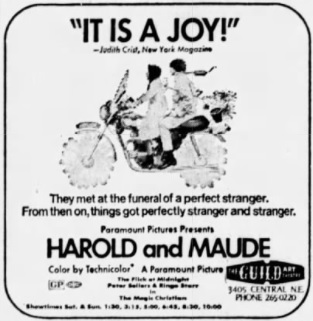 |
|
Fri 12 Jan 1973 |
The Hot House (1970)
Prison Girls (1972) |
Sat 13 Jan 1973 |
Harold and Maude (1971; premièred at the Fox 11 Feb 1972)
MIDNIGHT 13TH:
The Magic Christian (1969; premièred at the Lobo 08 Jul 1970) |
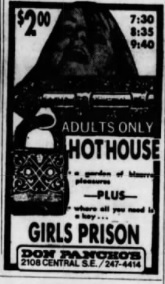 |
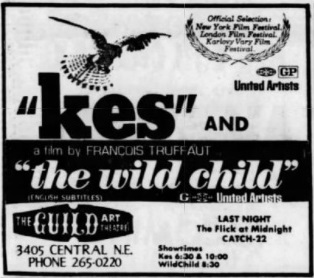 |
|
Tue 16 Jan 1973 |
The Hot House (1970)
Prison Girls (1972) |
Tue 16 Jan 1973 |
Kes (1969; Albuquerque première?)
The Wild Child (1970; premièred at the Lobo 06 Oct 1971)
MIDNIGHT 19TH AND 20TH:
Catch-22 (1970; premièred at the Hiland 27 Jan 1971) |

Why was Don Pancho’s closed?
Well, I had wondered for decades when Don Pancho’s converted its Peerless Magnarc carbon-arc lamphouses to xenon.
I had wondered for decades when Don Pancho’s abandoned its 2,000' enclosed rewinder and replaced it with a 6,000' open rewinder.
I had wondered for decades when Don Pancho’s discarded its change-over bells.
I had wondered for decades when Don Pancho’s junked its 2,000' magazines and replaced them with 6,000' reel arms.
I had wondered for decades when Don Pancho’s had installed its primitive automatic change-over system.
(I wish I could remember the make and model, but alas.)
Well, I need wonder no more.
It was around this time that cinemas began to install such equipment,
and this is the only time that Don Pancho’s was closed without an announced reason.
This MUST have been when those modifications took place.
This is also likely when the 16mm Bell & Howell Filmoarc was converted to xenon.
My biggest question was not so much when as WHY.
Why were these changes made?
What good did they do?
Now that decades have gone by, it occurs to me that Mr. Master worked at Don Pancho’s prior to these changes,
and that he witnessed these modifications.
That is because, one evening, he was telling me that the great advantage of 6,000' reels over 2,000' reels is that,
if something went wrong, with the larger reels, he had an hour to make the necessary repairs.
Back in the days of 2,000' reels, he had only 20 minutes at most.
That is why he preferred the larger reels and automation.
|
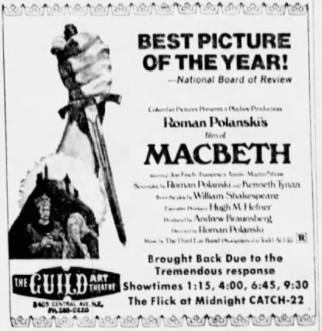 |
|
Fri 19 Jan 1973 |
CLOSED |
Sat 20 Jan 1973 |
Macbeth (1971)
MIDNIGHT 20TH:
Catch-22 (1970; premièred at the Hiland 27 Jan 1971)
MIDNIGHT 26TH:
Alice’s Restaurant (premièred at the Lobo 15 Oct 1969) |
|
This was not the première showing.
Don Pancho’s had run El Topo for a week beginning 5 May 1972.
|
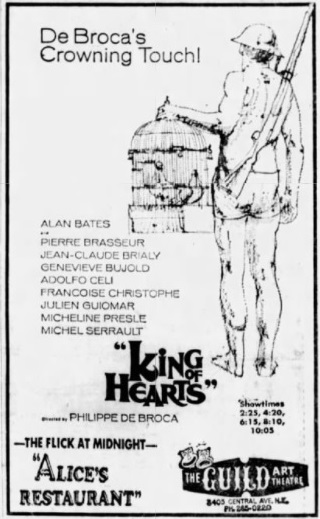 |
|
Wed 24 Jan 1973 |
El Topo (1970, CROPPED; premièred at Don Pancho’s 05 May 1972) |
Sat 27 Jan 1973 |
King of Hearts (1966; premièred at Don Pancho’s 15 Mar 1968)
MIDNIGHT 27TH:
Alice’s Restaurant (premièred at the Lobo 15 Oct 1969) |
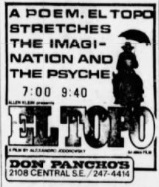 |
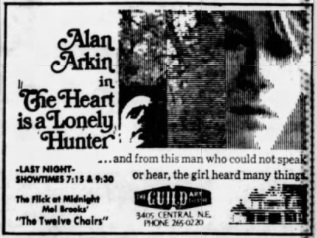 |
|
Tue 30 Jan 1973 |
El Topo (1970, CROPPED; premièred at Don Pancho’s 05 May 1972) |
Tue 30 Jan 1973 |
The Heart Is a Lonely Hunter (premièred at the Hiland 02 Oct 1968)
MIDNIGHT 2ND:
The Twelve Chairs (1970; premièred at the Guild 22 Aug 1972) |
And below we have the official declaration of war.
Don Pancho’s now gave its name in the newspaper ads as THE NEW DON PANCHO’S,
and its programming was an almost exact duplicate of the programs at The Guild.
If The Guild had had a success with a particular movie, The New Don Pancho’s would play it too.
Of the two cinemas, Don Pancho’s was definitely the superior one.
It was a bit larger, not quite as dark, not quite as dismal, and, besides, it was just across the street from the university campus.
Remember, this was 1973.
In 1973, many university students were movie-wild, but not for Hollywood pabulum.
They got off on Bergman and Fellini, they worshipped the Marx Brothers as icons of iconoclasm,
they held up Bill Fields as the antisocial emblem of their antiestablishmentarianism.
Now that we are in the 2020’s, this sounds hard to believe, but it was true, it really was.
University students were passionate about cinema.
Not all university students, of course, but an impressive number of them were.
The cinema was their church.
Those days are over, as we all know.
Now we can understand why the ATGoA installed the new automation.
Cinema owners, who know less than nothing about the technical side of cinema, were sold a bill of goods.
They were fooled by the salesmen into thinking that their presentations would be improved.
Of course, automation does not improve presentations in any way whatsoever.
(To make this point clearer, I should point out that film archives refuse to install automation, because it damages the films and degrades the presentations!)
Instead of purchasing the latest doodads with blinking lights, it would have behooved the ATGoA to mask that I-beam behind the screen,
to purchase more lenses to get the older formats on screen properly,
to get better masking, to hire an audio technician to improve the acoustics and playback,
to put the acoustical curtains on runners,
to purchase a few feet of land from the neighbor and move the exit door so that the screen could be enlarged
and placed in the center rather than be off-center to the left.
Further, the ATGoA should have spent a few thousand dollars on getting its equipment serviced.
Those machines leaked like sieves and they had loose parts.
They needed a professional to go through them top to bottom, and, further, to modify them to run silent films properly.
It would have been invaluable to sign a contract with a local musician who was trained to accompany silent films to do precisely that,
rather than run those films with canned music or dead silent, which is what Don Pancho’s did. That was horrible.
Better yet, the ATGoA should have purchased newer machines, ones that still had genuine parts on the market, machines that still had factory warranties.
It would have helped to make an investment in paying construction workers to increase the rake of the auditorium floor.
That’s what would have made a difference, not those useless gizmos that they spent way too much money on.
About accompaniment: When we watch silent movies now, we are watching them being assassinated.
Granted, on Blu-ray we can find splendid copies of silent movies, with sensitive scores,
but even so, it is not the same thing.
I have occasionally seen a silent film, in a properly restored and printed edition,
properly presented, full silent aperture, proper speeds, with a full orchestra accompanying the film
with a sensitive score that never overwhelms or contradicts the movie, but enhances it by underscoring it subtly.
That is an experience, an experience I have had only in California, and only rarely.
When we watch silent movies now, in black-and-white copies, dead silent, or with inappropriate music, or with canned music,
it’s just not the same thing, not the same thing at all.
Inappropriate accompaniment will totally wreck a film.
Unfortunately, nowadays there are composers who see silent films as mere excuses to show off some wild, emphatic music,
discordant cacophany,
and they expect us to clap our hands together at the conclusion and give a standing ovation.
Unfortunately, too many of us do.
As for me, I walk out in total disgust.
The very worst of all was accompaniment I heard by a small trio (French horn, violin, piano) who tortured
Pandora’s Box to death.
They were worthy of the firing squad.
They ruined that hauntingly beautiful, hypnotic movie, ruined it completely, utterly, absolutely.
|
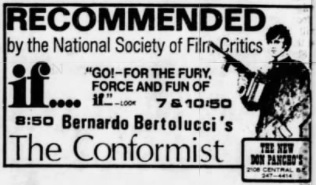 |
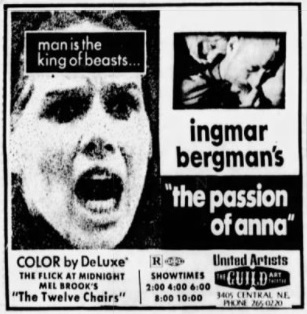 |
|
Fri 02 Feb 1973 |
if.... (1969; premièred at the Lobo 25 Jun 1969)
The Conformist (1970; premièred at Don Pancho’s 14 Apr 1972) |
Sat 03 Feb 1973 |
The Passion of Anna (1969; premièred at the Lobo 08 Jan 1971)
MIDNIGHT 28TH:
The Twelve Chairs (1970; premièred at the Guild 22 Aug 1972) |
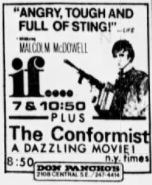 |
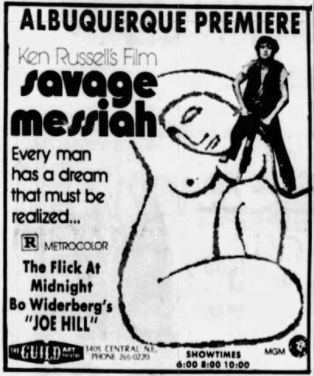 |
|
Tue 06 Feb 1973 |
if.... (1969; premièred at the Lobo 25 Jun 1969)
The Conformist (1970; premièred at Don Pancho’s 14 Apr 1972) |
Tue 06 Feb 1973 |
Savage Messiah (1972, Albuquerque première)
MIDNIGHT 9TH AND 10TH:
Joe Hill (1971; premièred at the Sunshine 26 Jan 1972) |
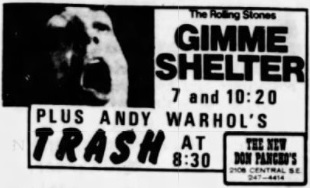 |
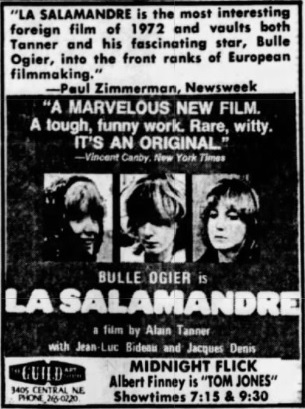 |
|
Fri 09 Feb 1973 |
Gimme Shelter (1970; premièred at Don Pancho’s 10 Sep 1971)
Trash (1970, CROPPED; premièred at Don Pancho’s 30 Apr 1971) |
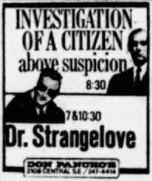 |
|
Fri 16 Feb 1973 |
Investigation of a Citizen above Suspicion (1970; premièred at Don Pancho’s 07 May 1971)
Dr. Strangelove (premièred at the Lobo 26 Mar 1964)
|
Tue 13 Feb 1973 |
La Salamandre (1971; Albuquerque première)
MIDNIGHT 16TH AND 17TH:
Tom Jones (1963; premièred at the Hiland 22 Apr 1964) |
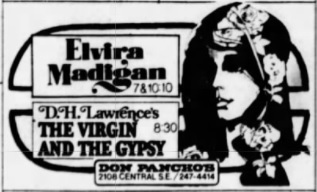 |
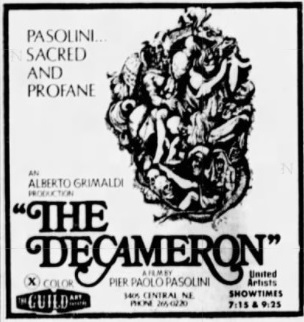 |
|
Wed 21 Feb 1973 |
Elvira Madigan (1967; premièred at the Cinema East 01 May 1968)
The Virgin and the Gypsy (1970; premièred at the Lobo 10 Feb 1971)
|
Tue 20 Feb 1973 |
The Decameron (1971; Albuquerque première) |
